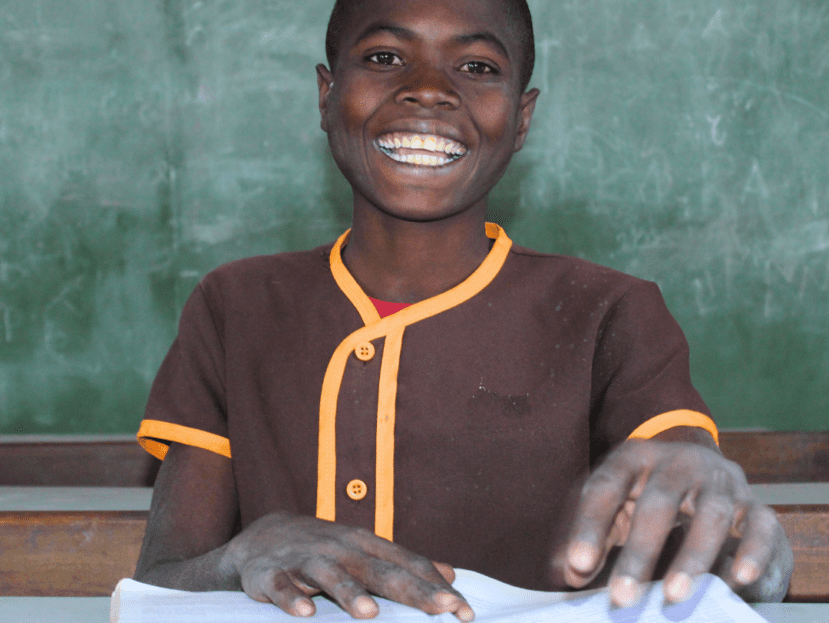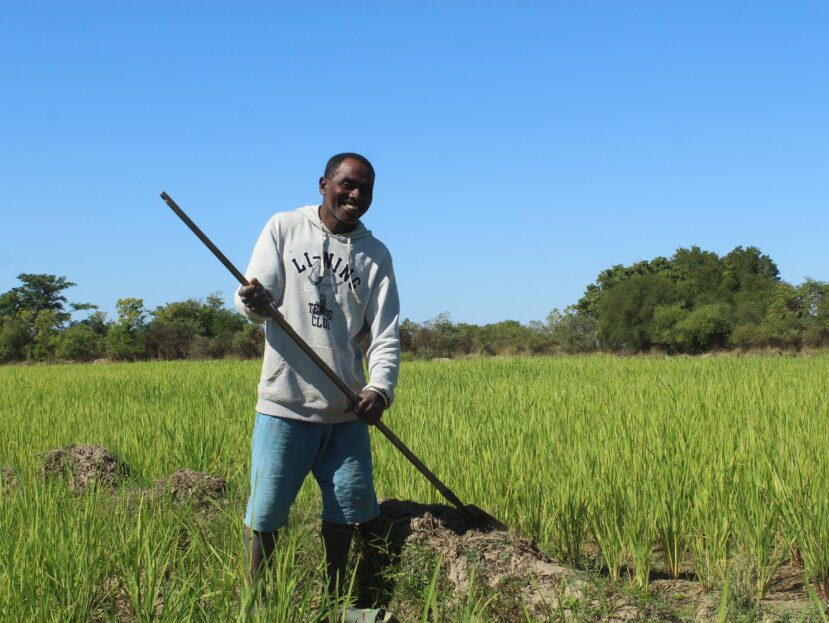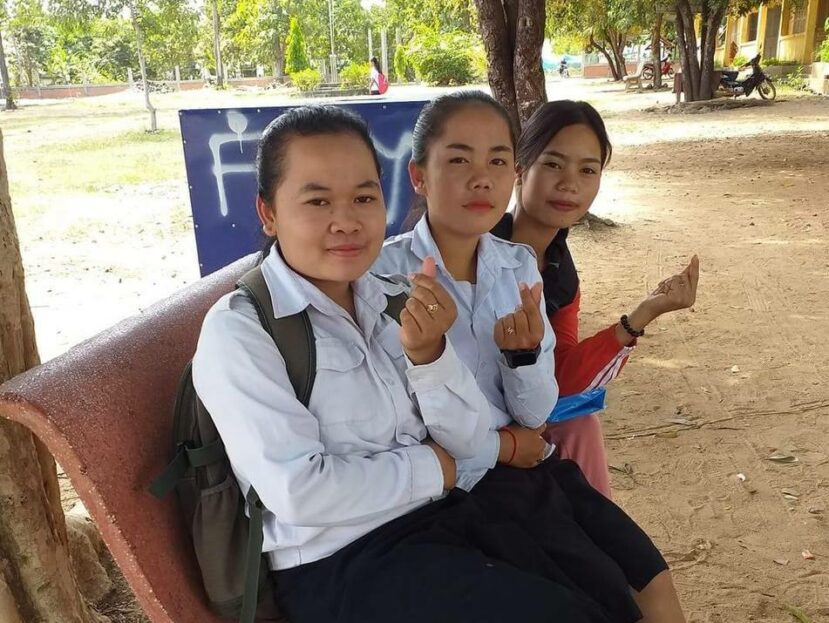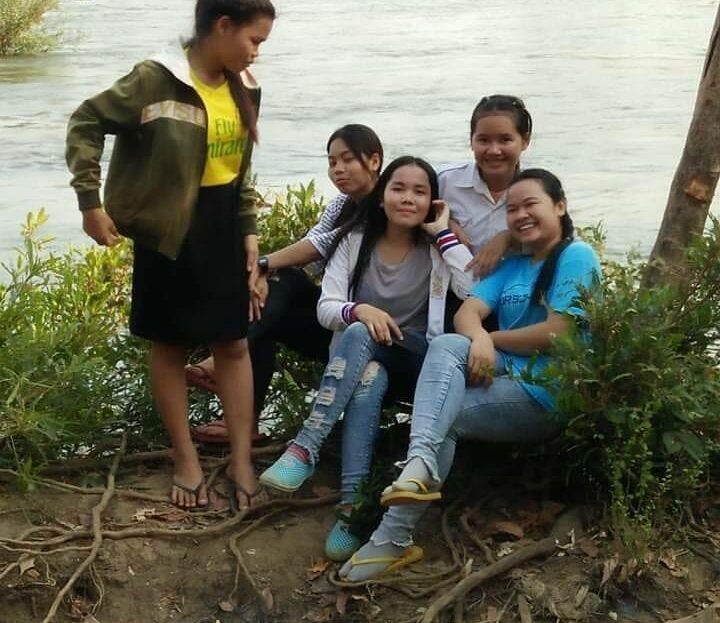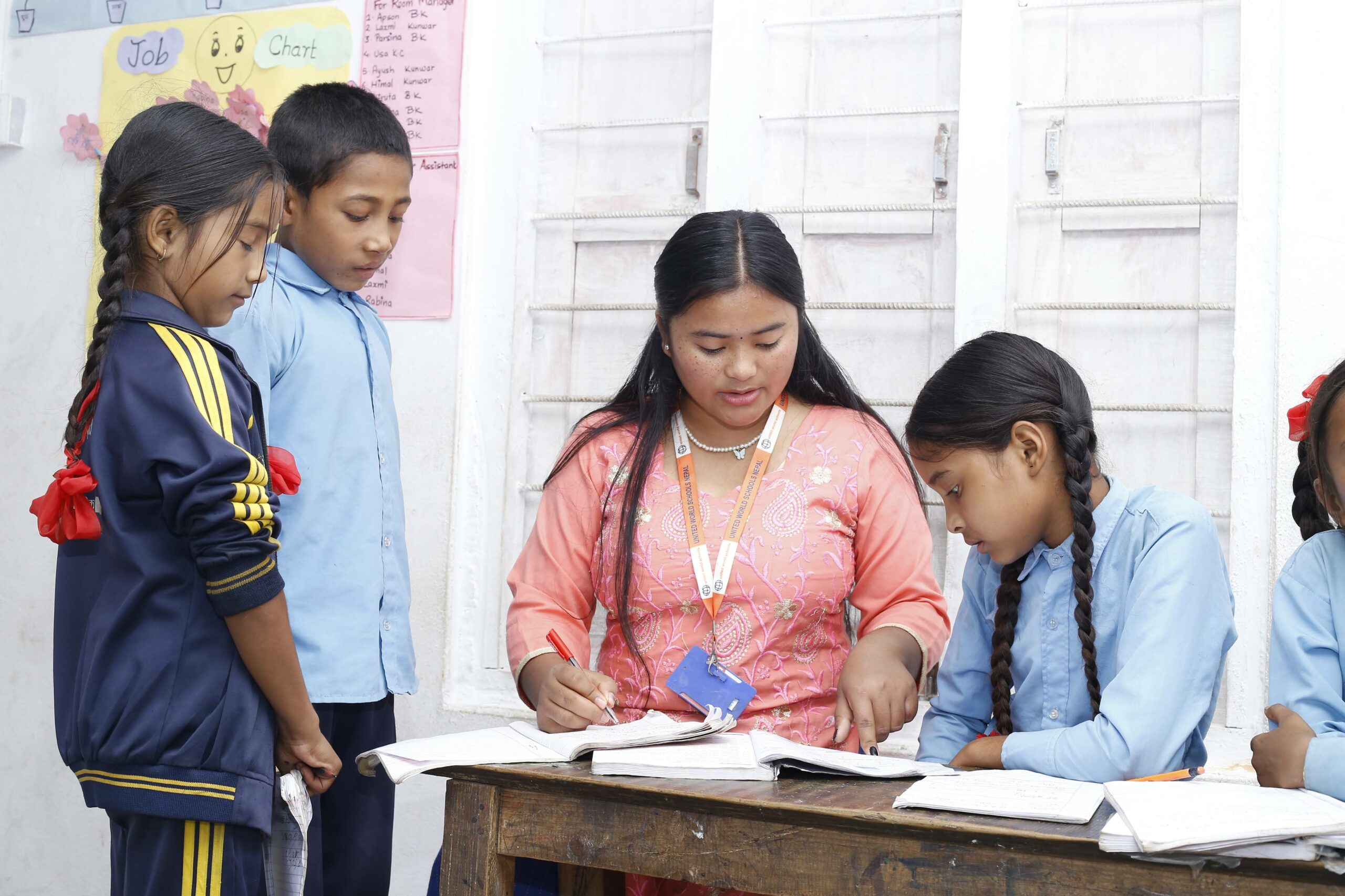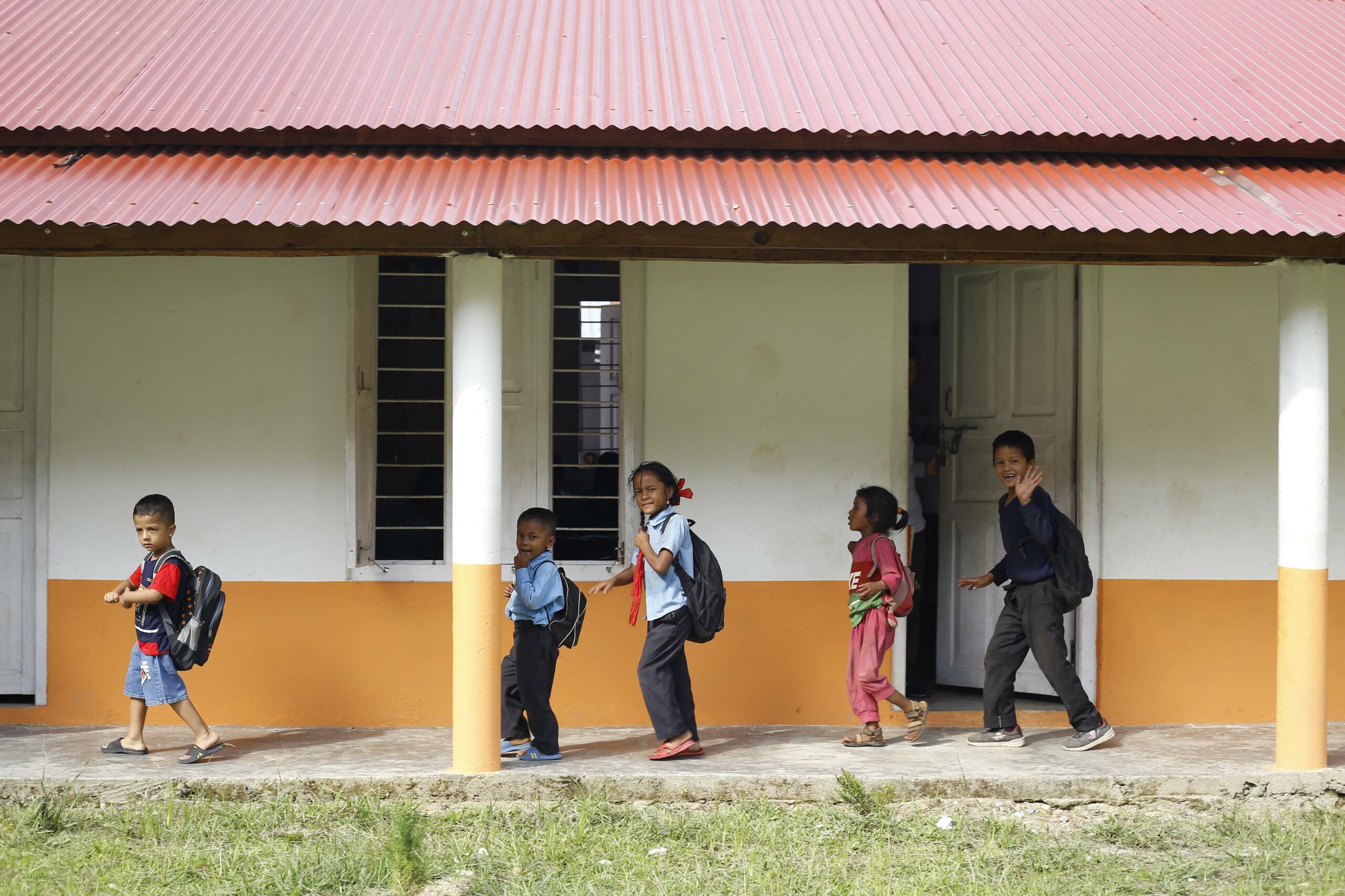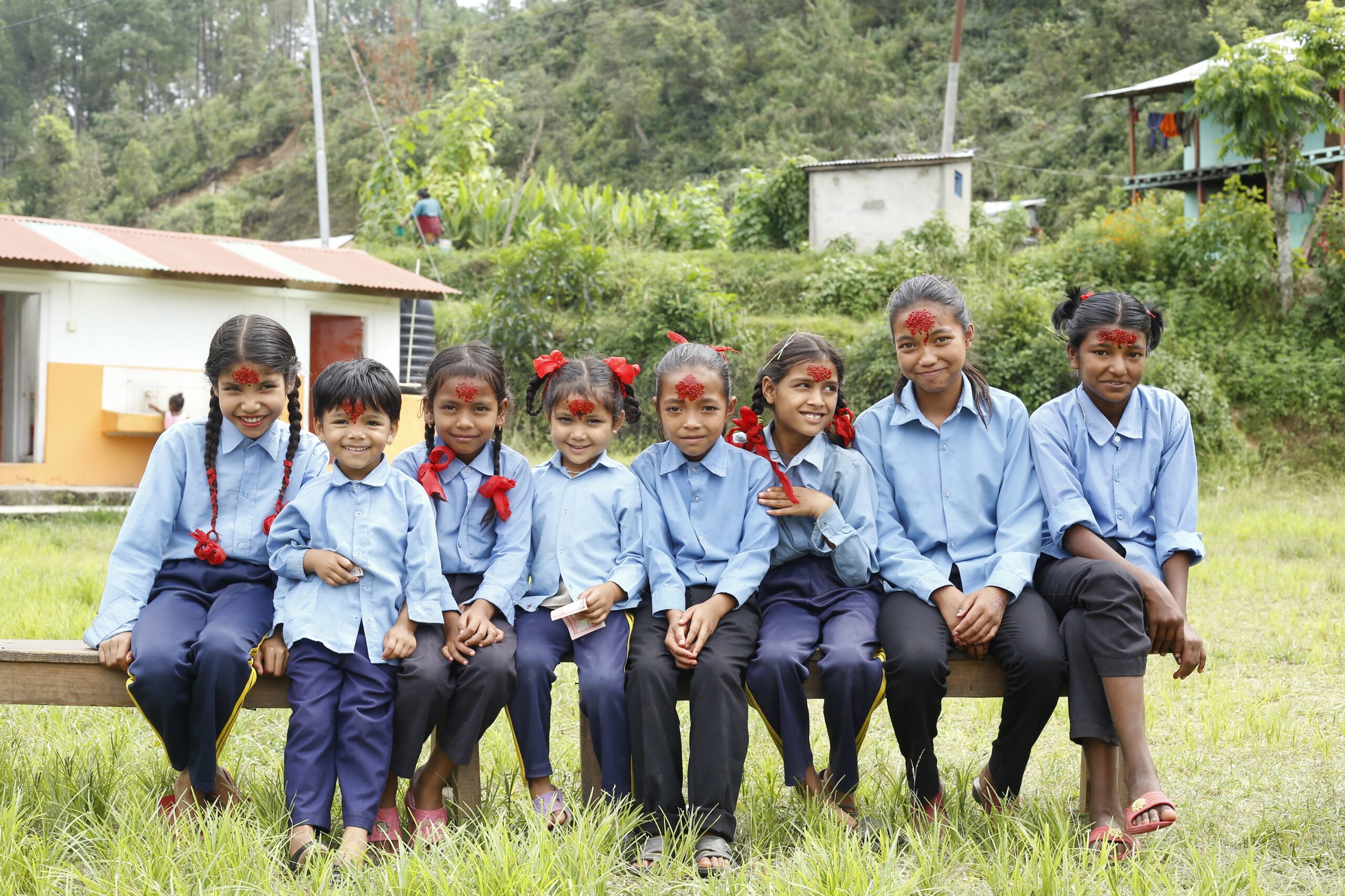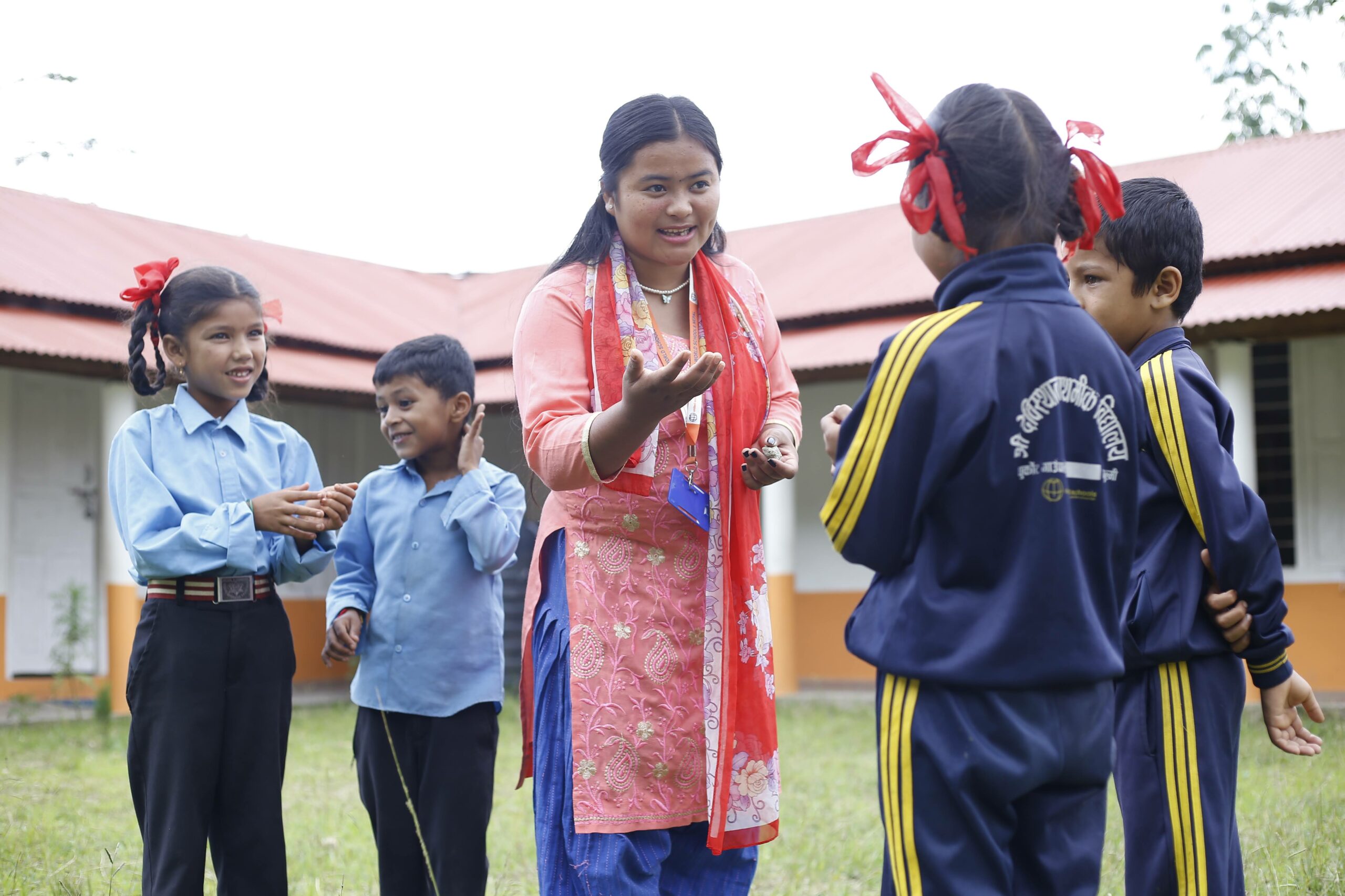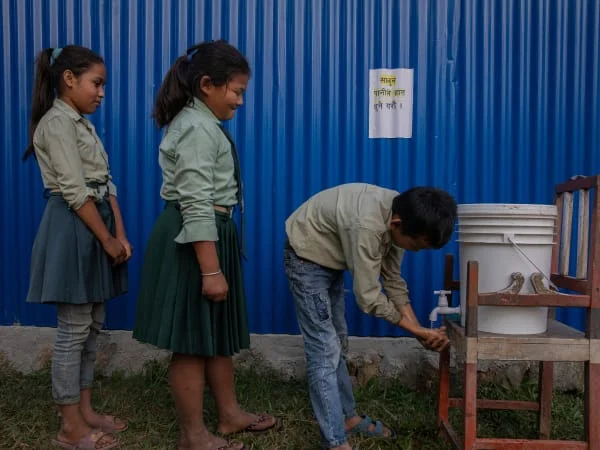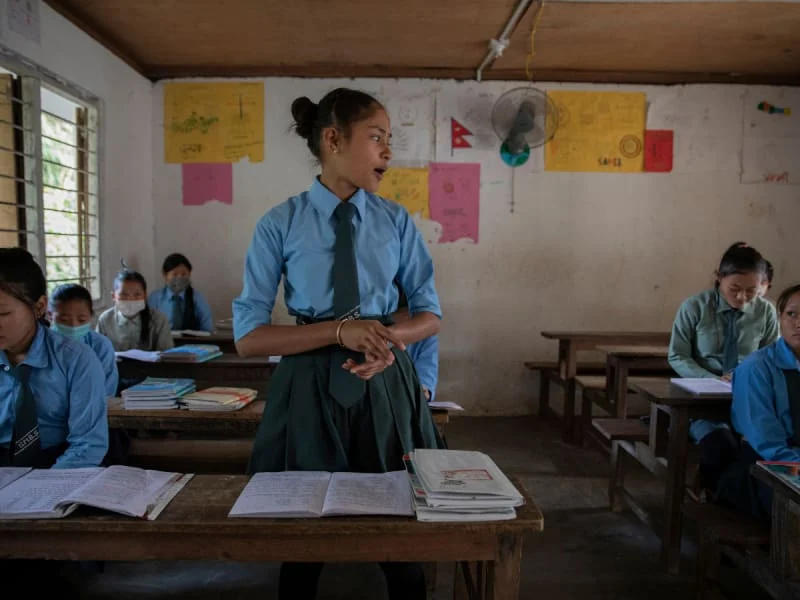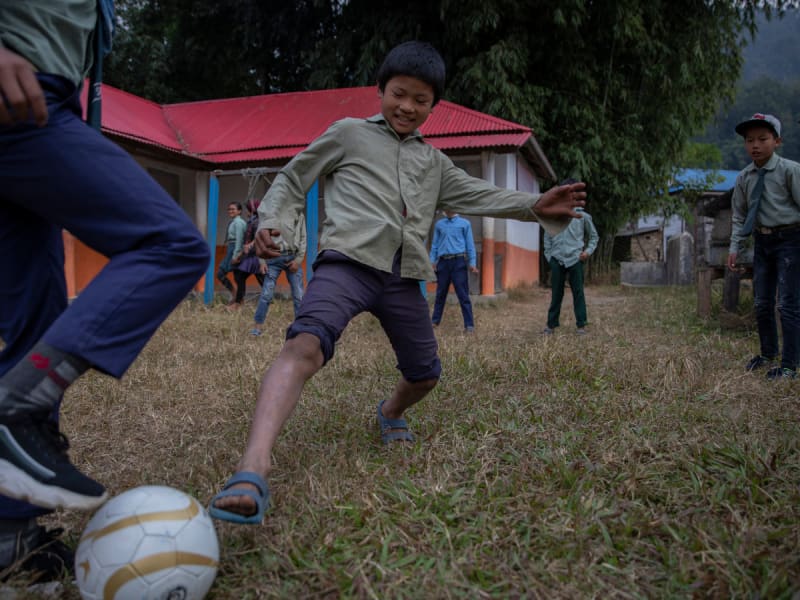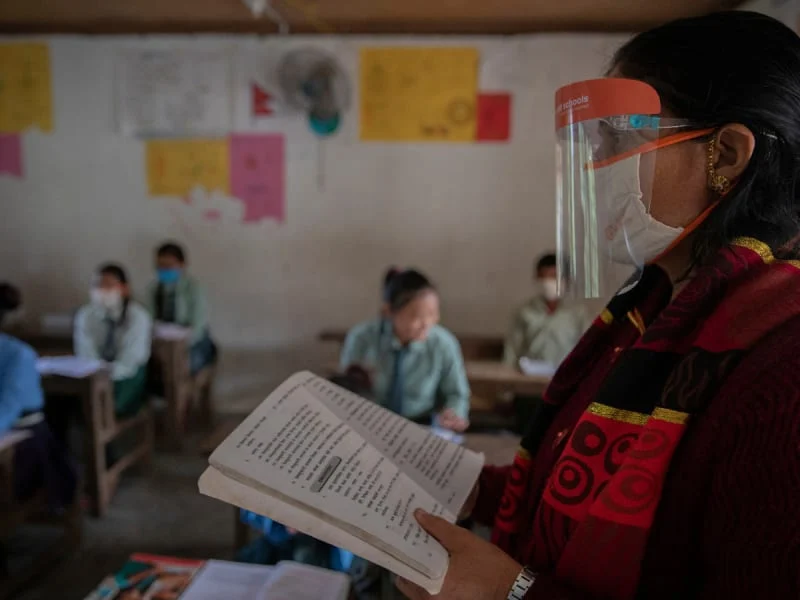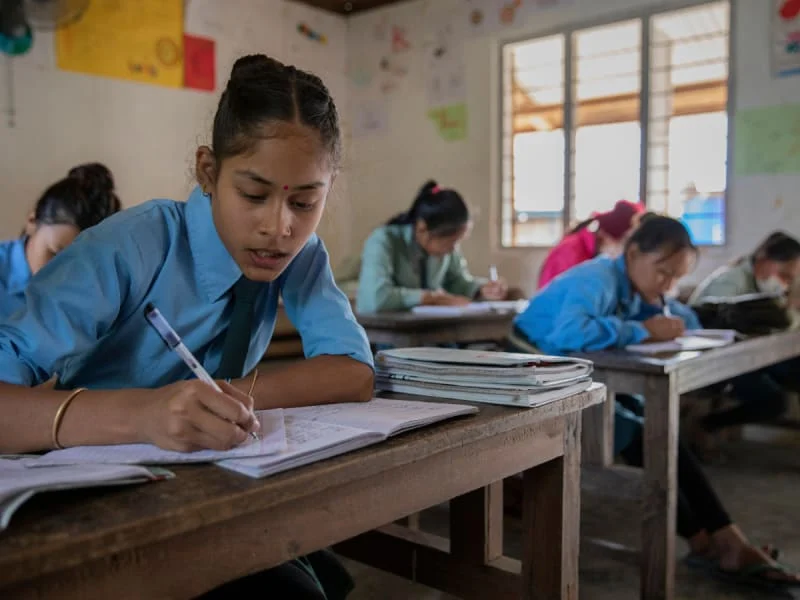The first day back to school is a day worth celebrating. Sharpened pencils and empty notebooks. School shoes and school bag ready by the front door. A uniform that you are either growing into or growing out of.
We all remember the joys (and first day nerves) of going back to school. And yet the first day has never just been about the new teachers, familiar classrooms and old friends. It has always been about fahafahana. That means opportunity to you and I - unless like Jiery, you also speak Malagasy.
Jiery*, a bright-eyed 14-year-old, once spent his days tending to the fields and caring for his siblings. But with the support of UWS, his life has taken a remarkable turn. Now, Jiery is thriving in school, eager to learn and dreaming of a future beyond the rice fields.
As we start the new school year across our schools in Madagascar, we’re sharing Jiery’s journey with UWS and the changes his father, Sambisoa, has noticed since we began working with his community.
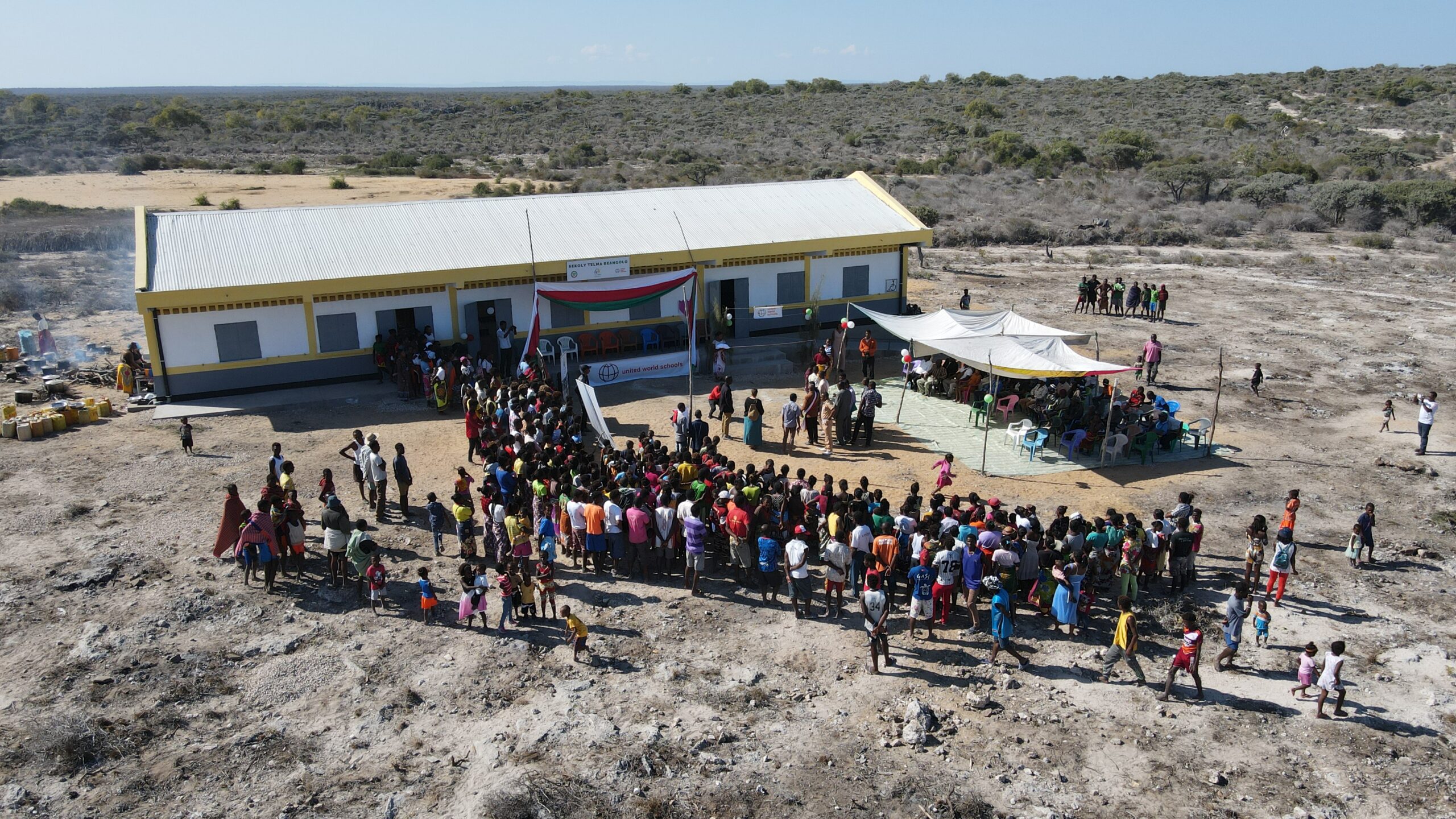
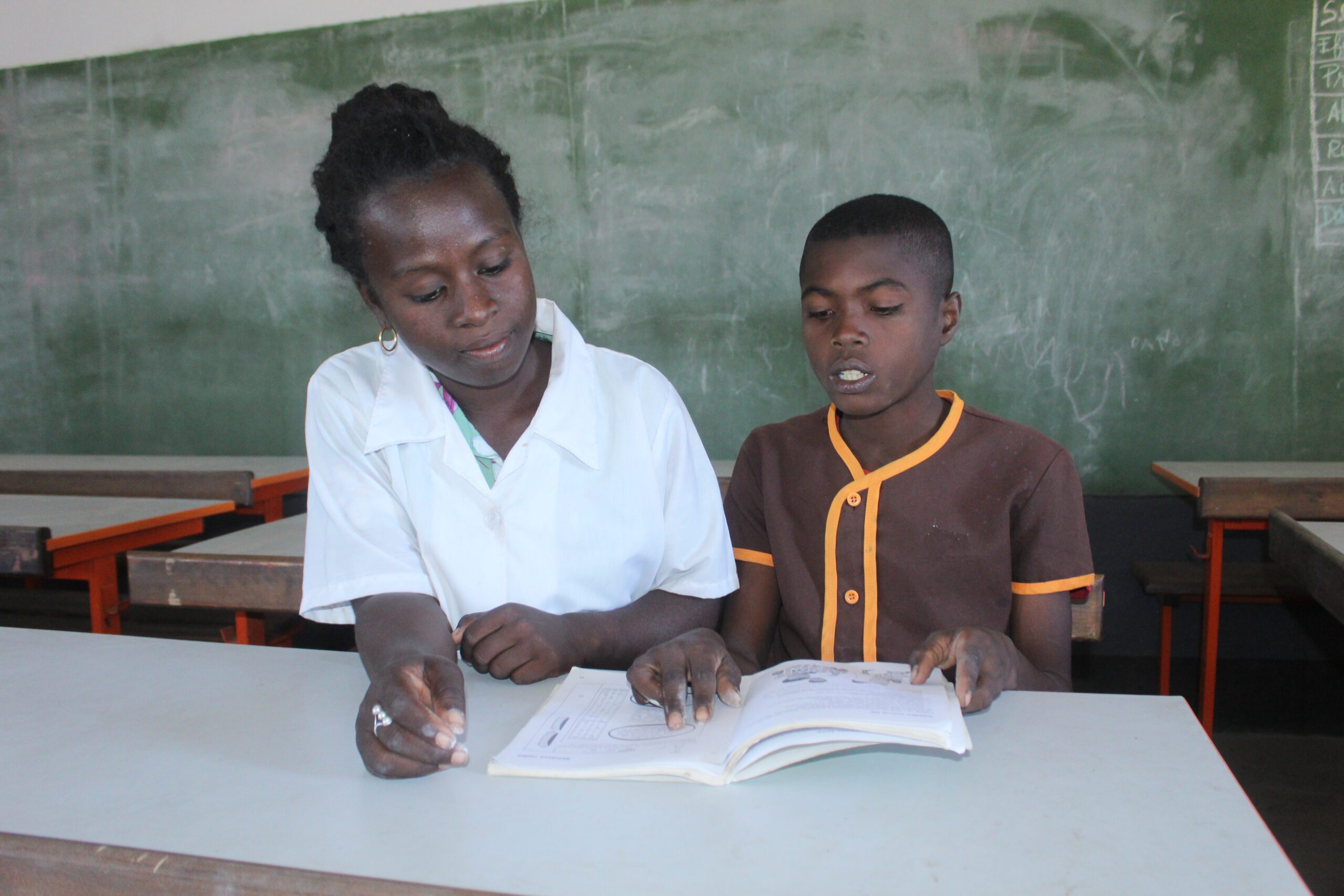
Meet Jiery
“My name is Jiery and I am 14 years old. I used to be in the Grade 3 class, but now I am so happy because I’m moving into the Grade 4 class. French is my favourite subject because I love reading.
I am very motivated to study in this school. I appreciate the teaching of my teachers and they make learning enjoyable. My biggest dream is to become a soldier when I grow up. It is a heartfelt wish because I want to protect my family. To achieve this dream, I know I must give my best every day in school.
I also motivate my friends to study – we all understand the benefits of education: having a job when we grow up, being able to provide for ourselves and receiving a salary in the future”.
Sambisoa’s Perspective: A Brighter Future
“I’m Sambisoa, Jiery’s father and a farmer specialising in rice cultivation. This work sustains my family, but the rice field I currently own will not be enough for my children in the future. I have five children and I educate them so that they can have a better future.
There have been remarkable improvements in education here since the arrival of UWS. There are real changes in the children, even the youngest in kindergarten are all learning very well. One of my children, who was sick and had to interrupt his studies, is still able to keep up thanks to the quality of the teaching. There are no more children herding the zebus here because they all attend school.
The education of our children presents immense advantages. Educated people do not suffer; they can find good jobs, count well when selling, and travel far without getting lost. And if my children all find jobs, they will be able to help me when I can no longer work”.
Education is more than just learning. It's a catalyst for change.
The first day of school is a milestone for children worldwide, marking the start of a journey filled with learning, growth, and opportunity. Yet, for many children in Madagascar, access to education remains a challenge. UWS is committed to changing this narrative by providing quality education and empowering communities.
By investing in education, we are investing in the future of Madagascar. Every child deserves the opportunity to reach their full potential. By supporting our work, you’re helping to create a world where education is accessible to all.
*name changed in line with our child protection and safeguarding policies.
Growing up in rural Cambodia, where educational opportunities are scarce, Sreykhiem faced a future seemingly determined by her circumstances. Her parents and eldest sister all left primary school early to support the family through farming.
In Rural Cambodia…
-
- The average child attends school for just seven years (LSMS, 2019)
-
- Only 17% of young people complete secondary school (LSMS, 2020).
-
- Only 8% of young people aged 18-22 years are attending higher education (LSMS, 2019)
Yet, thanks to UWS supporters like you, Sreykhiem has defied the odds.
From UWS, to secondary school, to today – enrolled as a first-year Information Technology (IT) student at the Digital University of Cambodia.
This is the power of giving to UWS. By funding access to quality, inclusive education, you also fund the tools and support needed to dream and succeed, and that those tools can transform lives like Sreykhiem’s.
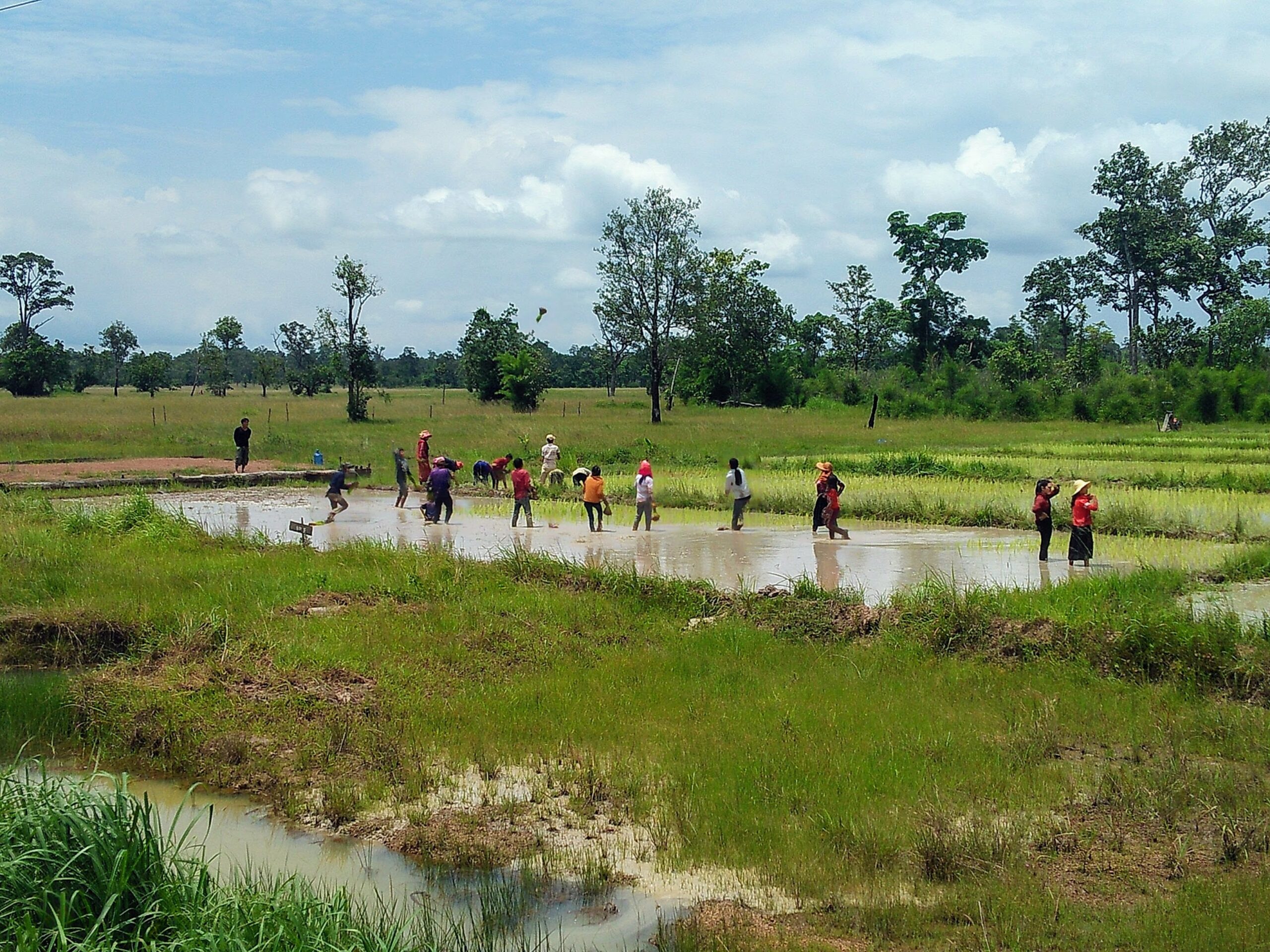
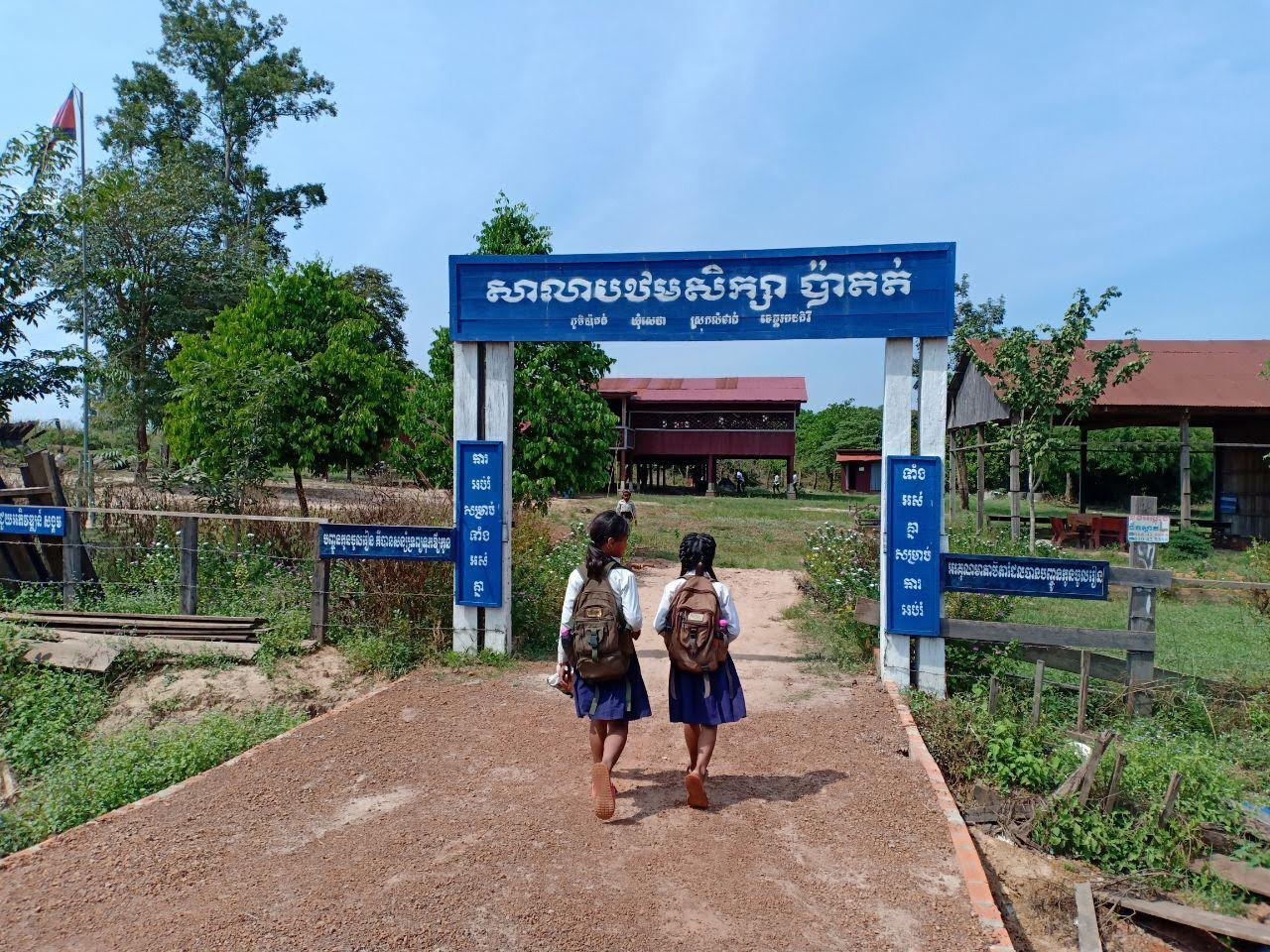
In Cambodia, we’re proud to share that 95% of UWS students go on to secondary education or vocational training (January 2023), breaking the cycle that has trapped generations of families in poverty and illiteracy.
Today, Sreykhiem stands tall as a testament to the power of education.
Her hard work and dedication earned her a coveted 100% scholarship in IT. Looking back, she credits UWS for opening her mind, building her confidence, and igniting her passion for learning.
Her success story is a powerful reminder of the ripple effect of education.
By investing in primary education, you’re not just supporting individual children, you’re supporting them to create better futures for their families, communities and countries.
Every child deserves the opportunity to reach their full potential. By supporting our work, you’re helping to create a world where education is accessible to all.
To get to school, 9-year-old Manoj has to walk for roughly one hour each way through forests and mountain streams.
HIS WORLD
Manoj is 9 years old and lives in a remote village in eastern Nepal with his parents. His father is a daily wage earner and his mother tends to the family’s modest field and cattle.
To get to school, Manoj has to walk for roughly one hour each way through forests and mountain streams. This long walk to school is not just tiring, it’s also dangerous – particularly during times of heavy rain, when there are chances of flood and landslides. Due to work commitments, his parents can’t accompany him on this journey.
Managing time for his studies is also a struggle for Manoj. A large part of his time is spent helping his parents, and with school far away, he was struggling to attend school regularly. In fact, he was absent nearly 50% of the time.
HIS EDUCATION
From 2021 to 2024, we’re partnering with the Education Above All Foundation’s Educate A Child programme to support more than 5,100 children in Cambodia and Nepal to stay in school and realise their full potential. At each participating UWS school, we’ve established a School Retention Team which we’re training to identify and monitor the children at-risk of educational marginalisation and school dropout and to provide targeted support to these children.
Due to his low-school attendance and other factors, Manoj is just one of the students in a UWS school who have been identified as at-risk of dropping out through this programme.
Our Education Team developed an individual school retention plan to support Manoj, and conducted home visits to support his family in sending him to school regularly and catching up on the lessons he missed. The project’s various interventions to support children like Manoj under the Dropout Prevention Programme, including regular monitoring, provision of school supplies, and holding holiday & evening catch-up classes, motivated him to go to school every day.
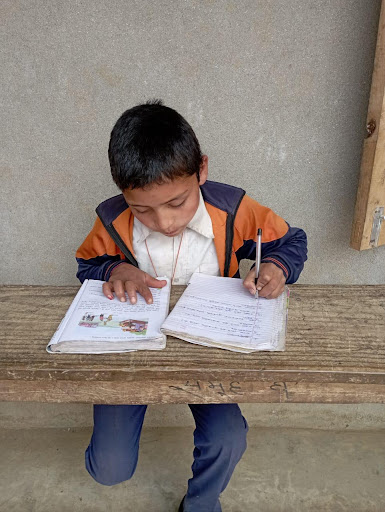
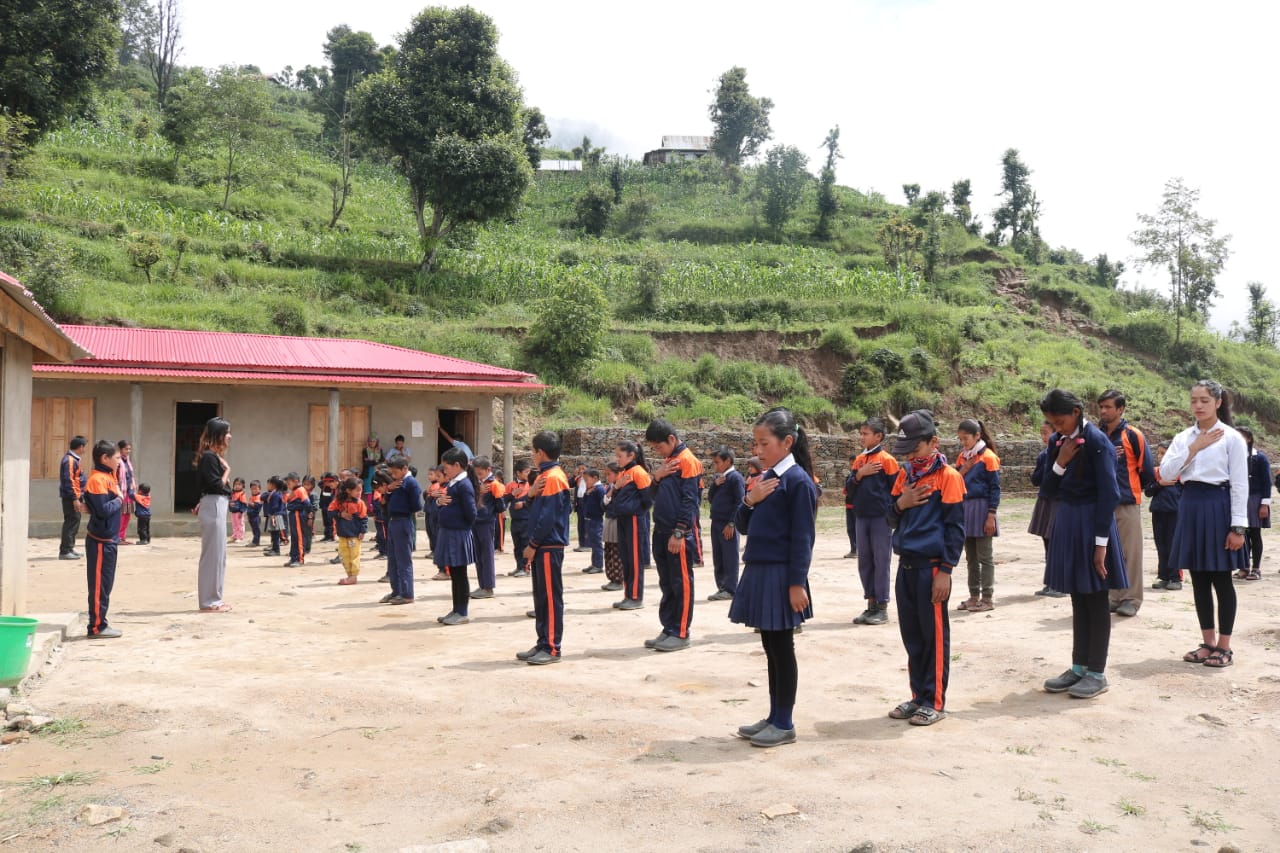
“I am very happy with the improvement of Manoj in his studies and look forward to him achieving greater things in the future.”
Manoj’s father.
HIS FUTURE
Manoj is not alone in the challenges he faces. In Nepal, approximately 29% of students who enrol in Grade 1 drop out before they finish the primary cycle. Yet through partnerships, like that with Education Above All’s Educate A Child programme that have brought about initiatives such as the joint Dropout Prevention Programme, we have a chance to address this statistic.
We’re pleased to share that Manoj’s school attendance has significantly improved and he now attends nearly every day, is performing well in class and enjoys playing with his friends. Manoj and his family hope that his education will lead to a bright future.
"In the future, I would like to be a teacher. I wish to share all my knowledge and ideas with the next generation"
Oun, Grade 6 Student at UWS Chop Pring School
Meet Oun
Oun*, age 16, lives in Ratanakiri Province in the northeast of Cambodia. This is a region of immense poverty, where 21% of children fail to complete primary school. But Oun, who studies in Grade 6 at UWS Chop Pring School, is one of hundreds of students determined to change this statistic.
“My parents didn’t get the opportunity to study,” explained Oun. “They work on the banana farm, but they have always supported me to go to school. They encourage me to study hard, to graduate, and to get a good job in the future”.
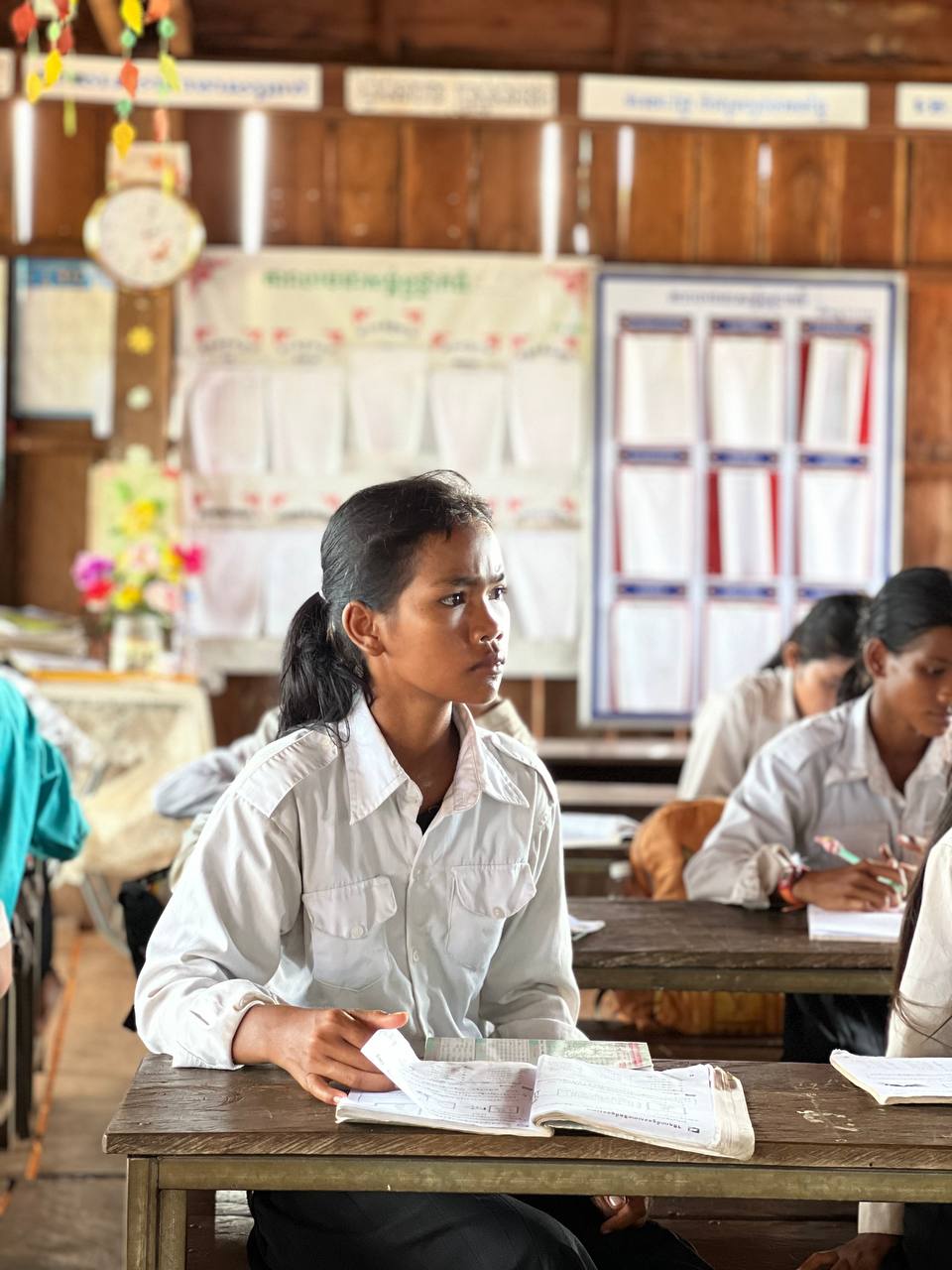
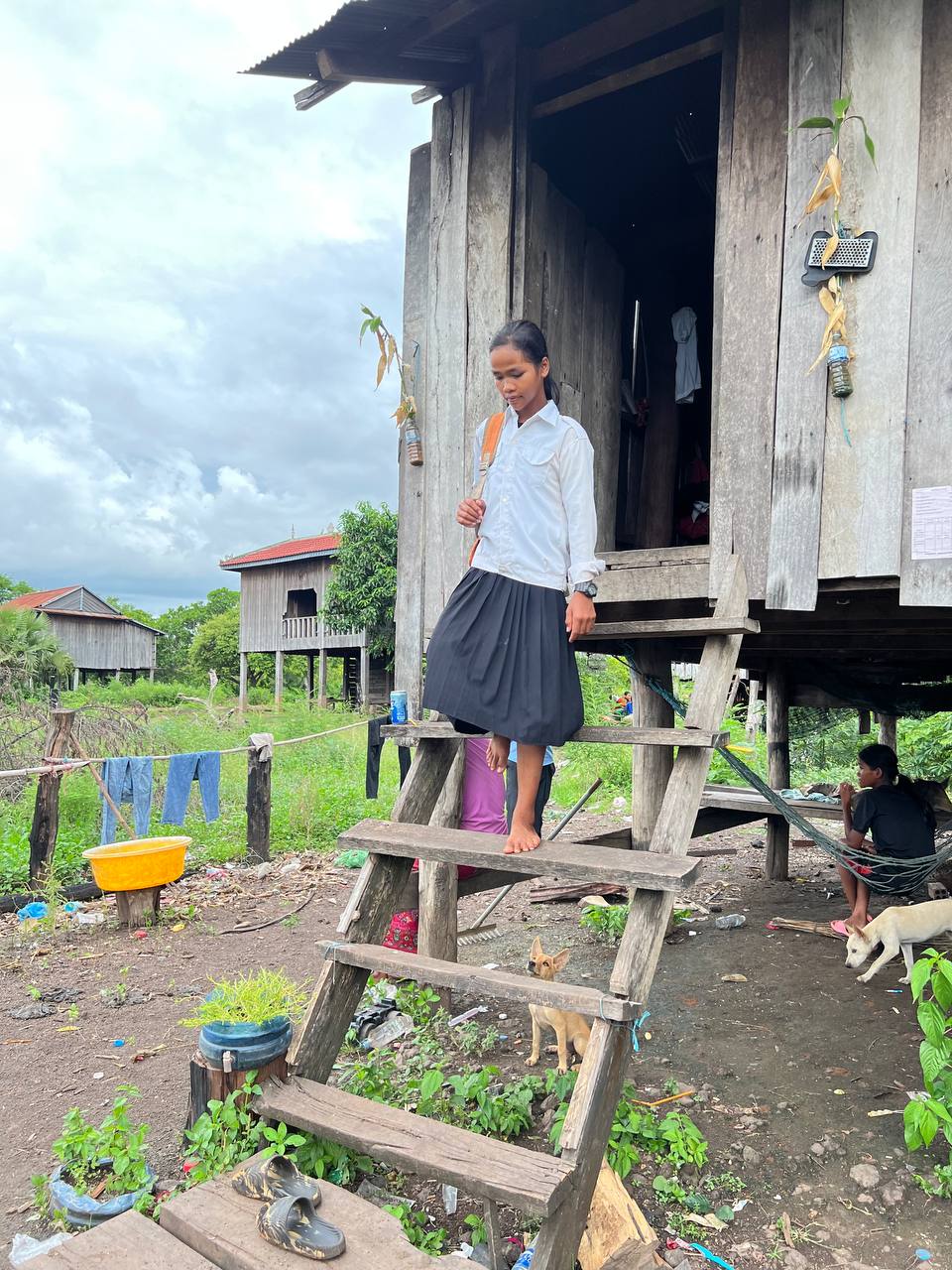
“I hope that all my students will graduate and find a good job to help their community".
Chenda Doung Ak-Run, Teacher at UWS Chop Pring School
UWS Chop Pring School
Before the opening of UWS Chop Pring school, only 10% of the community could read. As a remote community who speak their own Lao dialect, rather than Khmer (the national language and language of instruction in government schools) access to education in the region was extremely limited. The majority of children in the community did not go to school.
UWS Chop Pring School was constructed and opened in 2017 and Chenda Doung Ak-Run has been a teacher here from the very beginning.
“I am very happy to share my knowledge with the students in the community, especially as all the students are trying to study hard and always come to school” he shared. “I’ve been working hard with the parents encouraging them to send their children to school”.
“All the students like solving the exercises in a group. They help each other in learning and they have good cooperation in improving the school environment and decorating each classroom and the school library.”
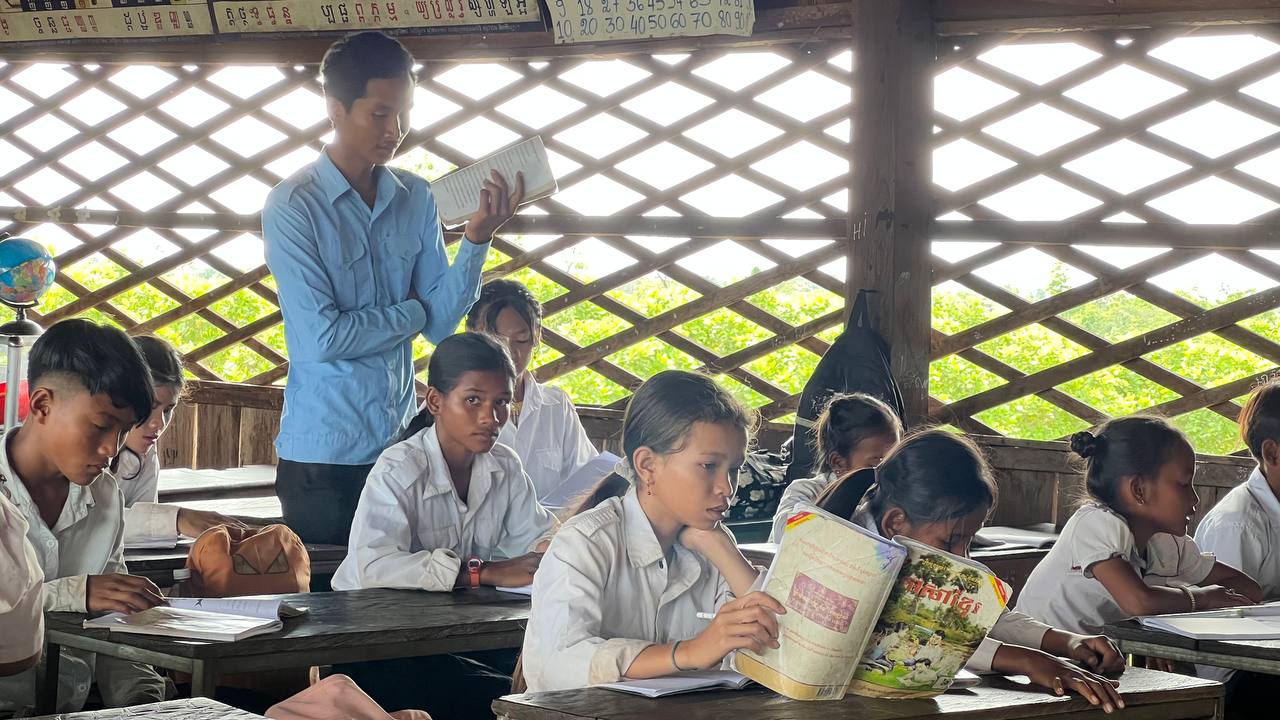
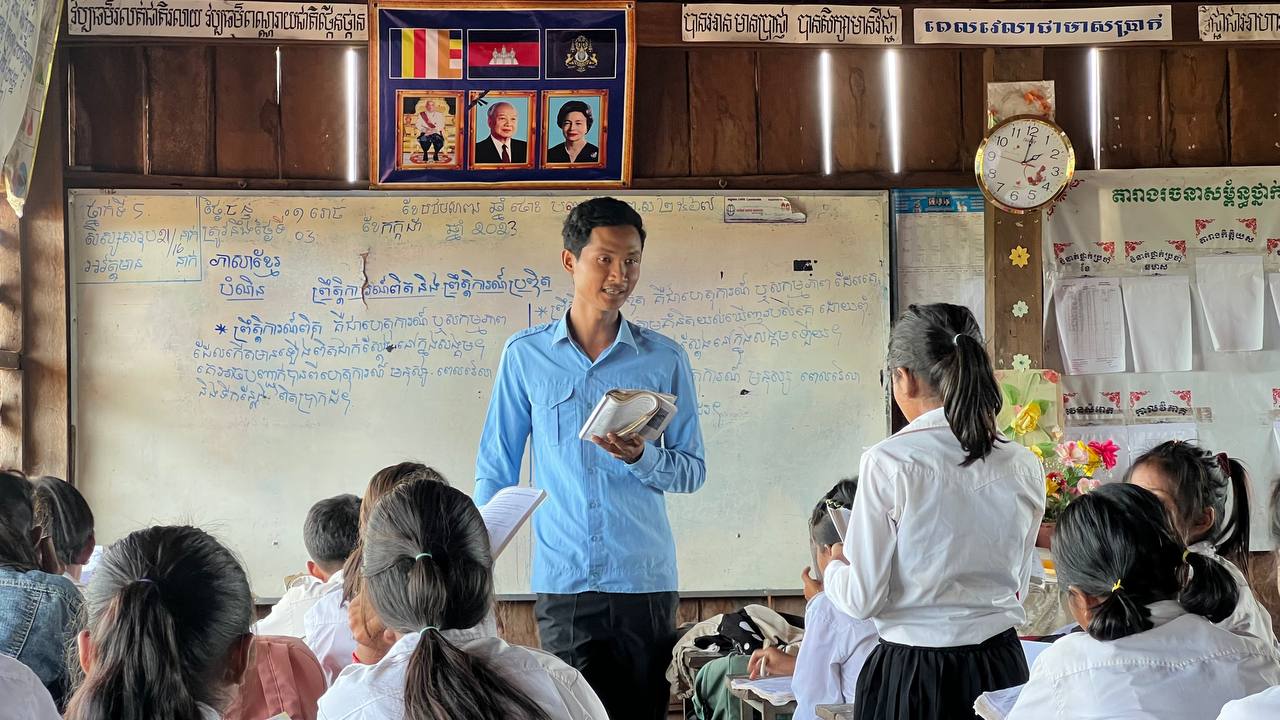
“I taught at UWS Wein Wa School during the 2022 academic year. Here the children don't speak Burmese, rather Palaung."
Poe Myat Noe, UWS Community Teacher
Her World
As a child, all Poe Myat Noe wanted to become when she grew up was a nurse. She was inspired to work with and help others. Although she was unable to realise this dream, she turned her desire to work with children into a new passion: teaching.
Poe Myat Noe, began her teaching career in a self-established school in Na Baw in rural Shan State of Myanmar. This school became UWS Na Baw School in 2019. Since then, Poe Myat Noe has taught in various UWS Schools across Kyaing Tong District, lending her skills as an excellent teacher to each school community. She spent the last year teaching at UWS Wein Wa School in Tachileik District, which she reflects on here.
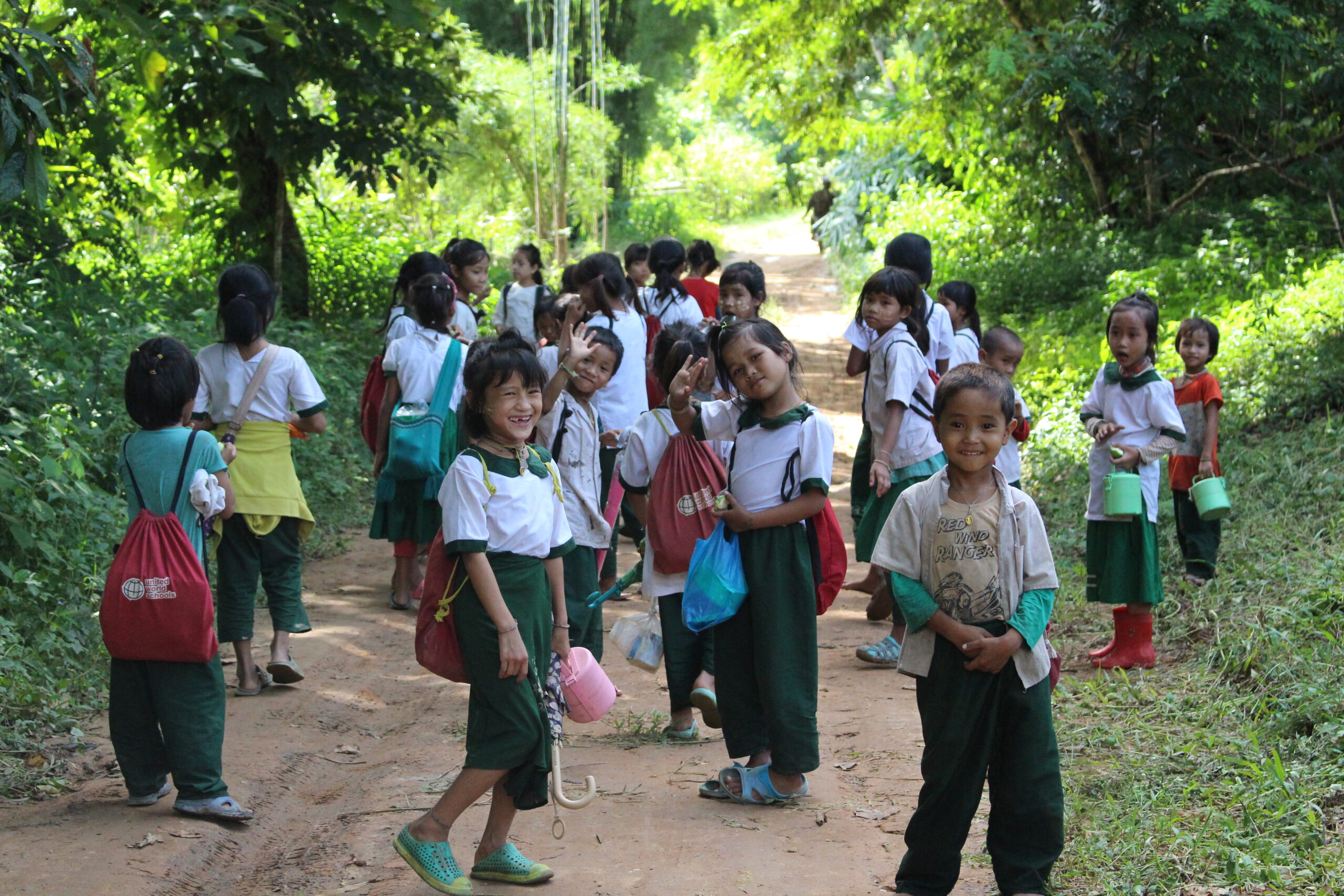
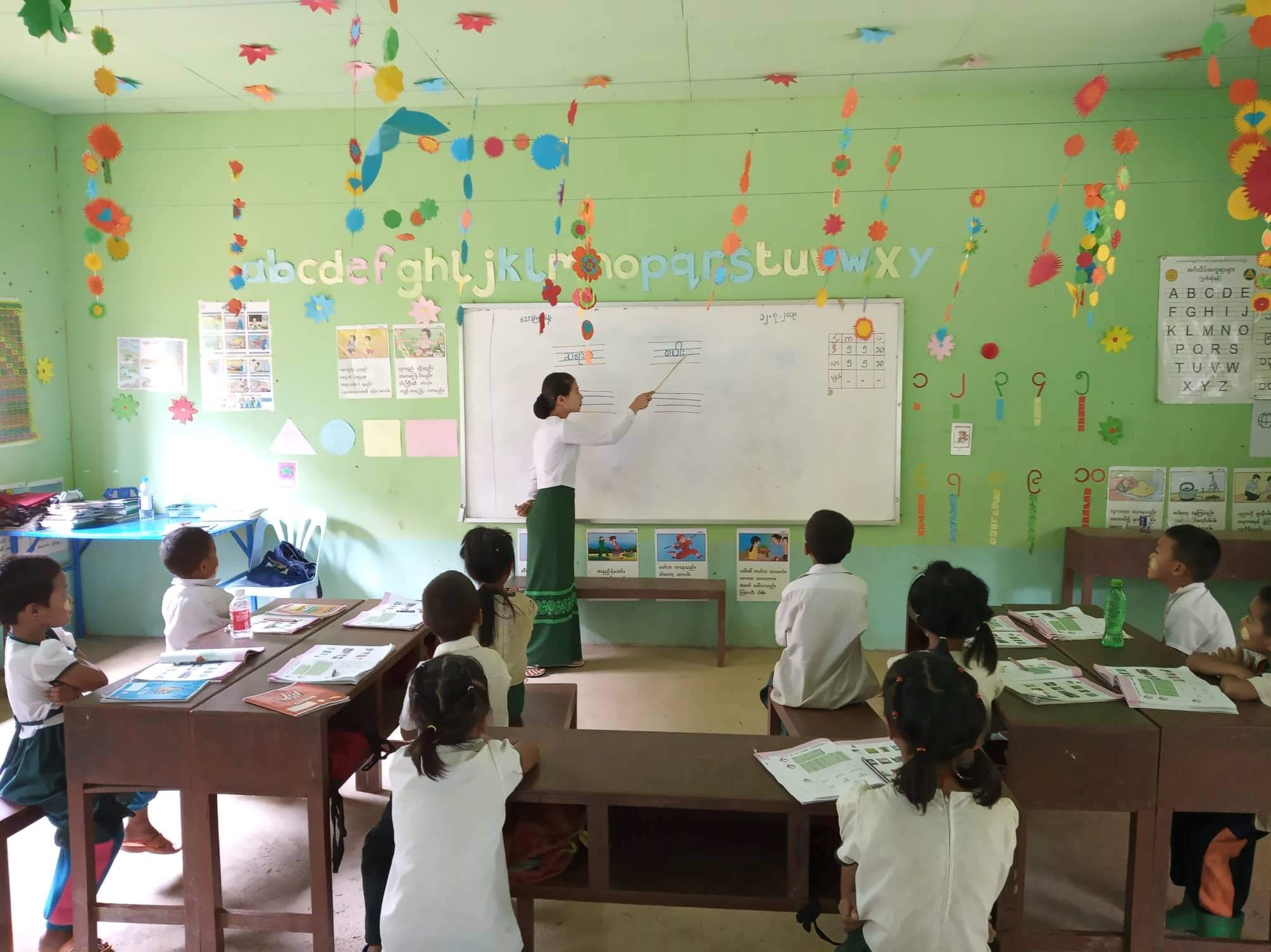
“Initially I found it very challenging. However, with the guidance and encouragement of my UWS Education Officer, I tried different teaching and learning methods".
Poe Myat Noe, UWS Community Teacher
“I taught at UWS Wein Wa School during the 2022 academic year. Here the children don’t speak Burmese, in Wein Wa village the community is made of Palaung and Mong people – very few members speak Burmese. I also can’t speak their language. When I asked them to repeat after me in Burmese, all the students responded the same way, like rote learning.
Initially I found this very challenging. However, with the guidance and encouragement of my UWS Education Officer, I tried different teaching and learning methods. The children have made significant progress!” shared Poe Myat Noe.
OVERCOMING CHALLENGES
With over 135 different languages spoken across Myanmar, the linguistic barriers to education which Poe Myat Noe overcame at UWS Wein Wa are far from unique. On occasions when UWS is unable to recruit community teachers who can speak both the local language and Burmese, we place experienced community teachers, like Poe Myat Noe, in these schools to boost learning of Burmese (the language of the education system) and support the children's education.
We're immensely grateful to teachers like Poe Myat Noe for their dedication and hard work.
“This school fills me with joy, as it does the other parents. I am happy that my son is becoming wise. I can see him making an effort with his studies. When I look in his books, it makes me so proud to see his handwriting".
Falina, Mother
Her World
Falina and her family live in a remote coastal village in the Atsimo-Andrefana Region of Southwest Madagascar. This is an area renowned for its extensive coral reefs, mangroves and seagrass ecosystems; habitats which are critical to the livelihoods of the region’s coastal population.
Falina is a farmer, supporting her family predominately through cassava crops. Other community members base their livelihoods on fishing or sea cucumber farming (echinoderms often called sea slugs or zanga). This is a vulnerable livelihood, heavily impacted by frequent flooding, tropical storms and cyclones which disrupt the fragile ecosystem balance.
UWS Ankindranoke School
UWS opened UWS Ankindranoke School near Falina's village back in 2022.
Every morning, Falina accompanies her son, Vonjy, to the school.
"The school is a walk away from our village, but I encourage the children to go every day. I accompany them to the school before returning to my work. This is my responsibility as a mother and I will always do this," shared Falina.
Although Vonjy is 10 years old, he has enrolled in the Grade 1 class. Due to the rural location of his community, Vonjy never had the opportunity to receive an education but he isn't letting this discourage him. Previously, his days were spent helping his mother in the fields, or fishing. As the first in his family to go to school, Vonjy knows that education offers him the chance to break the cycle of poverty:
"I really love school in Ankindranoke," shared Vonjy. "In the future, there will be many opportunities here for people who have studied. I want to be one of them. I would like to learn how to speak French and travel to different cities. I will make every effort to achieve these goals".
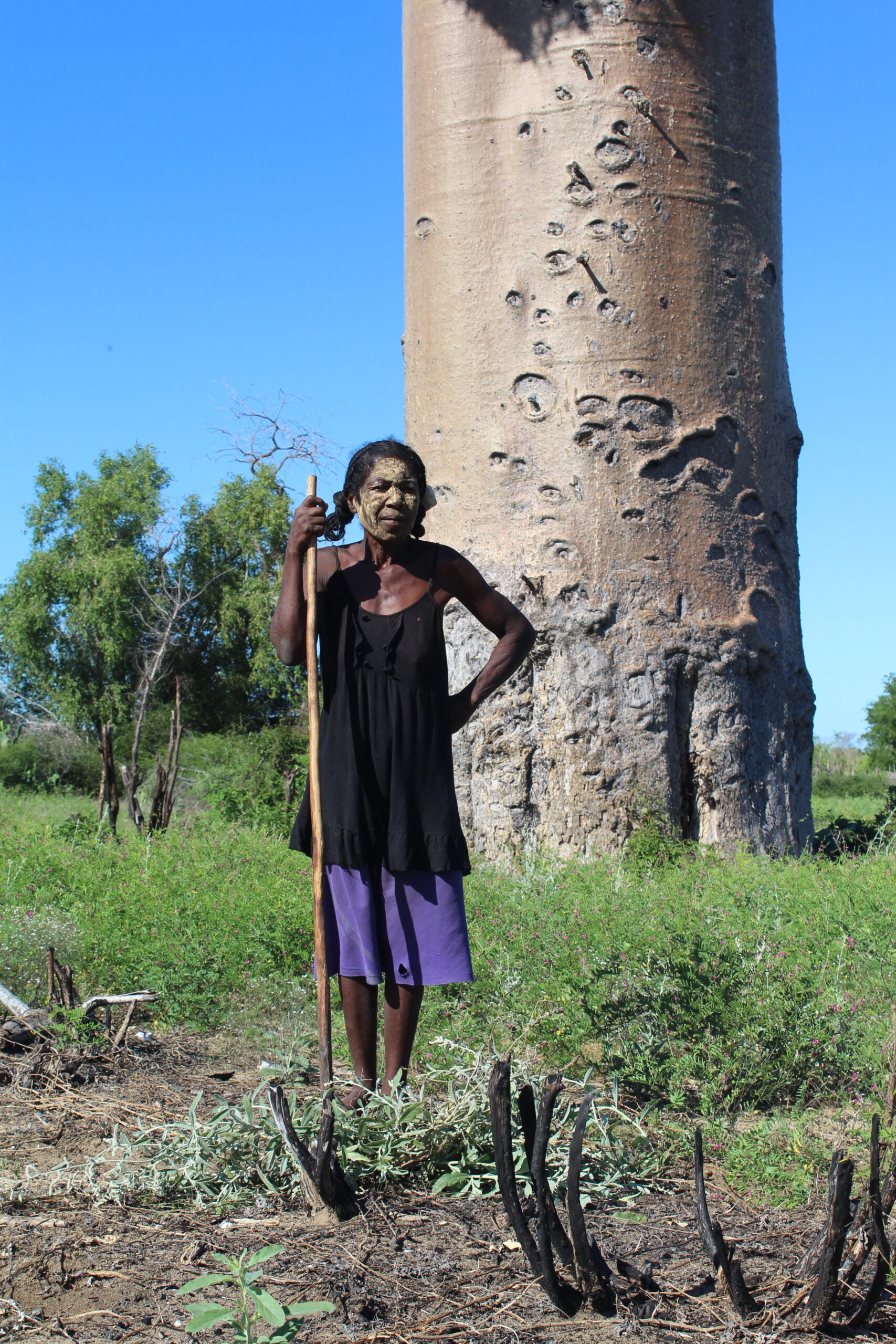
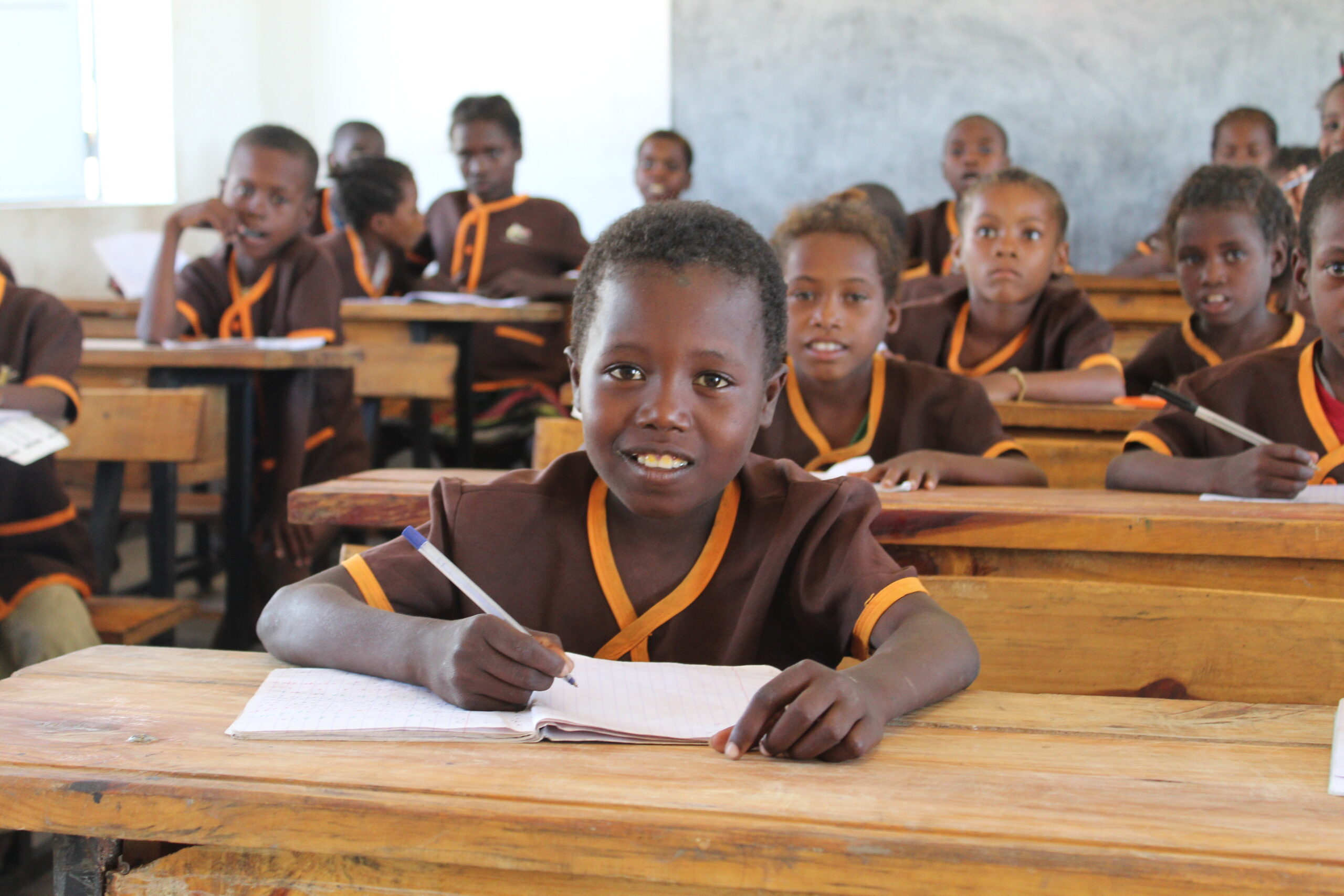
“Imagine, we start school at 7:30am in the morning, and by 7am the children are already at school. The children and parents are very enthusiastic about the school".
Rizmae, Grade 1 Teacher at UWS Ankindranoke School
Rizmae, Grade 1 Teacher
“Vonjy is in my class; he is a wise boy who is very curious to learn. Before, he never went to school so he is a bit old to be a Grade 1 student, but that doesn’t stop him from wanting to learn.”
“This new school has really made a difference. The building gives our village scale, with this big solid building, we give the impression of not being in a small remote village. The parents are also enthusiastic about sending their children to study and we have over 300 children in the village”.
“There are also the teacher training courses provided by UWS which have helped me a lot. I have a better understanding now of pedagogy and I use what I have learnt during my classes. The students are really receptive and I hope this will continue. The children here were behind in their schooling, but now they are immensely enthusiastic about it. You can see that they really want to study”.
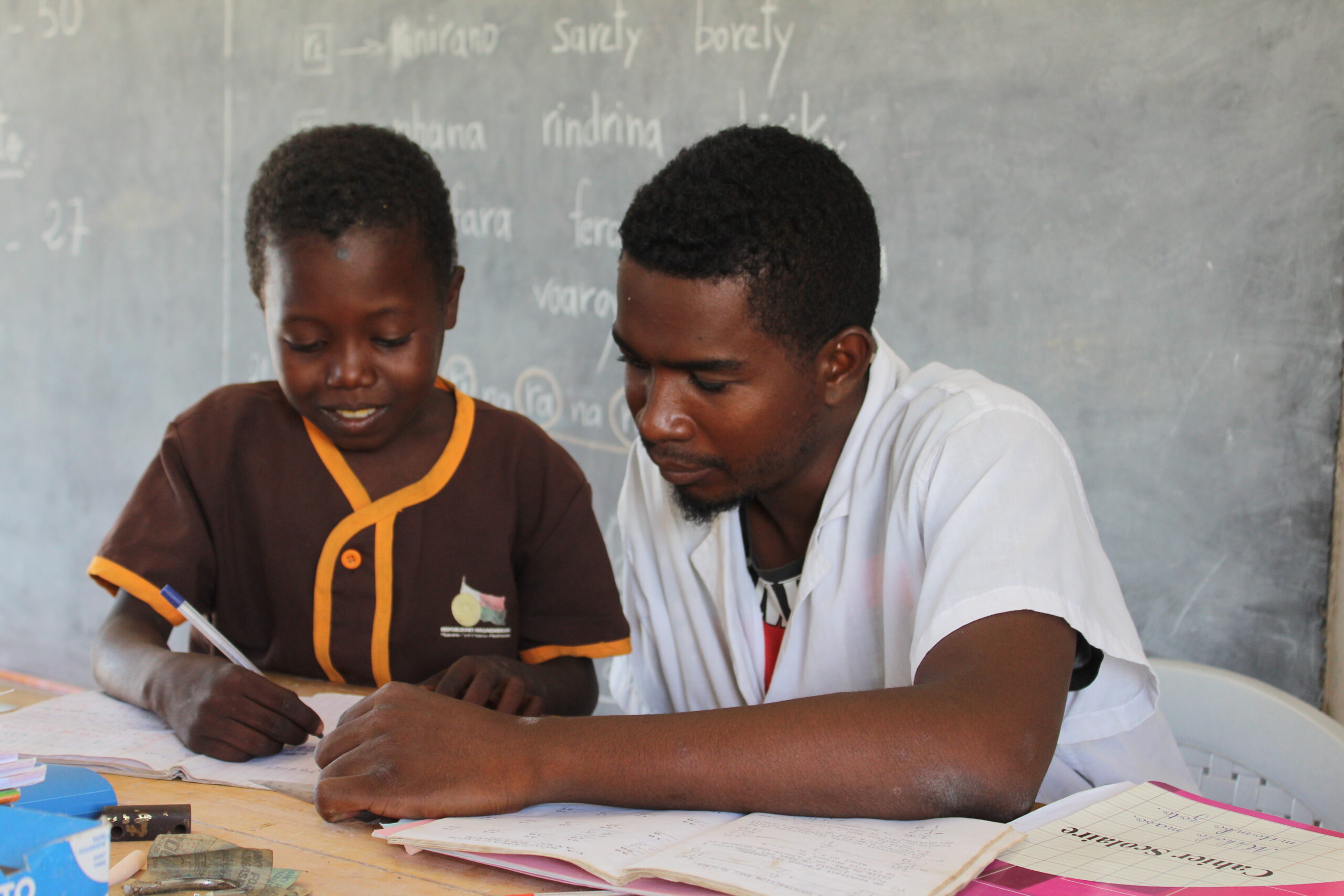
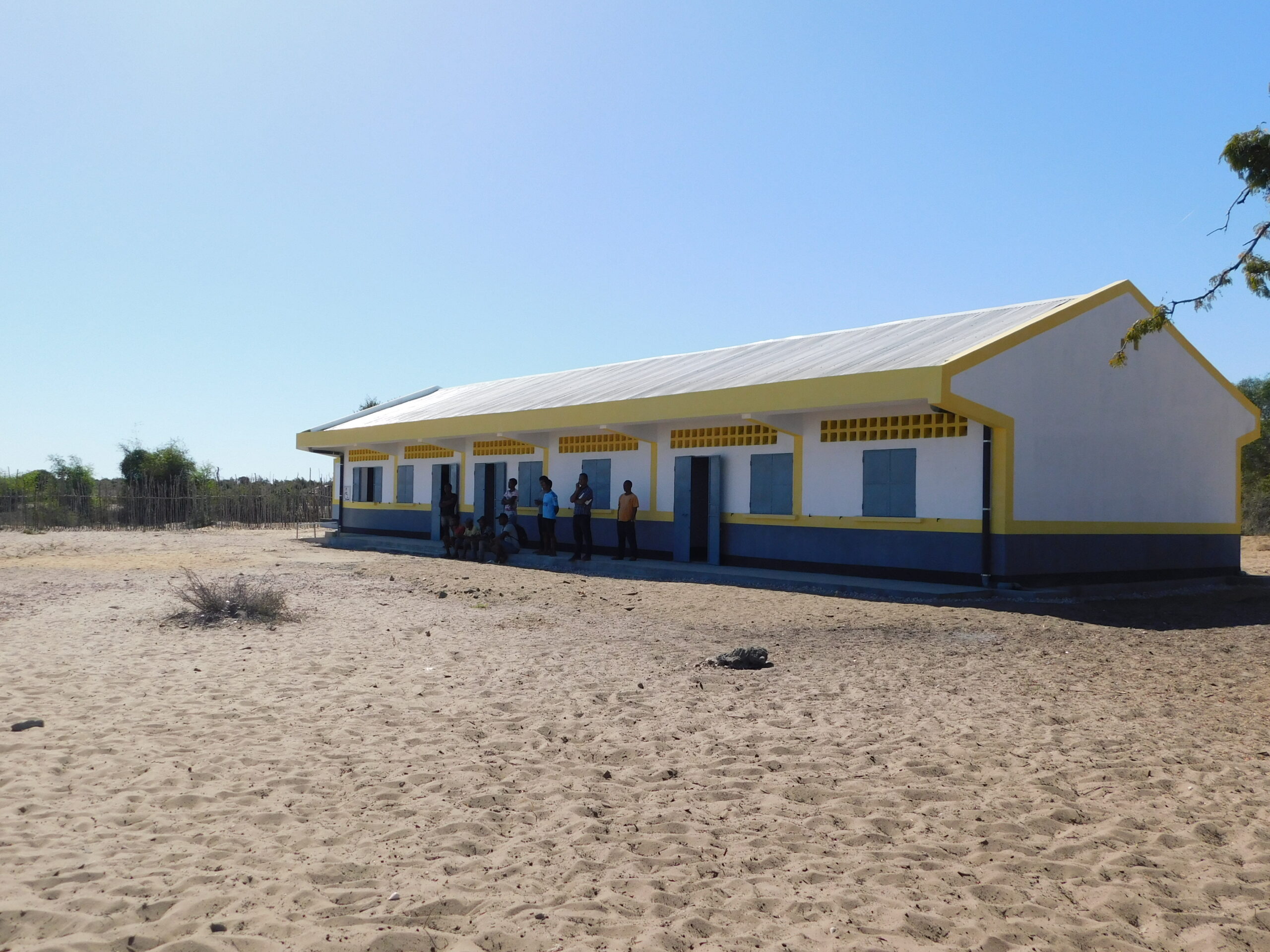
“When I first joined the UWS teaching fellowship, I knew that I would be teaching students who had struggled to received a quality education. What I didn't know was that I would get the chance to learn so many things myself"
Tirsana Gaha, UWS Fellow
How did you first learn about UWS and what were your motivations for becoming a UWS Fellow?
Growing up in the rural village of Badagau in Gulmi District, accessible quality education was a challenge. By the time I was studying at college, UWS Nepal built a school in my village (the school where my little brother is enrolled today). I saw first hand the remarkable changes that the UWS school brought to my village.
My family was also the host family for the Teaching Fellow who was placed at UWS Badagau School. This was how I learnt about the UWS Fellowship Programme. When the application call for the UWS Teaching Fellowship was made in late 2021, I decided to apply without a second thought! I wanted to be part of the change that UWS Fellows are bringing to the educational sector across Nepal.
What subjects do you teach?
As a fellow, my main role at UWS Jaisithok is teaching English and Maths. There are different kinds of students in the school and they each have their own way of learning, some are kinetic learners, some are visual learners and others are verbal learners. I teach students using different kinds and materials, utilising what we have around us. I use paper a lot of the time, making flashcards and posters, and teaching by playing games. In some schools in Nepal it is still common for children to only be taught theoretically, so I always try to make sure that my students are being taught practically and are actively learning. I sometimes make up songs because students learn much faster from songs.
What initiatives and roles have you been involved in at UWS Jaisithok School?
Beside teaching, I work with the school team. Ensuring that we work as a team, to continually improve the school. We have to work hard in order to make school better. We have to change the traditional way of teaching.
I have been involved in forming different clubs at UWS Jaisithok School, such as the girls' club and mothers' club to empower girls and mobilise parents. I also helped to form a club for the children to develop leadership skills, like a student council. The Child Club is a group of students who are active members of their school community. They have responsibility for discussing the school environment and they are leaders to mobilise student power. The Club helps the children to understand their rights and their responsibilities. There is also the opportunity for the students to talk to local government figures about their school.
An additional part of my role is community mobilisation, I've been doing home visits as home visits are the most effective way to mobilise a community. Home is the place where we get to understand the circumstances of each student. What problems the student could be facing, what things are blocking the child to grow. All these things can be understood from visiting a child's home and speaking with their parents and/or guardians. I do home visits twice a week where I speak to parents about the importance of education and support them to make a child-friendly learning environment at home too.
"When I first joined the UWS teaching fellowship I knew that I would be teaching students who had struggled to receive a quality education. What I didn't know was that I would get the chance to learn so many things which will be life time experience for me. Initially I thought only luxurious life can give satisfaction but the satisfaction that you get from the smiles of the little, innocent faces of the students - that can't be compared to any other thing. This fellowship journey has made me stronger than ever, and, importantly, happier than ever."
Mr Hout Veasna champions creativity across the six UWS schools which he oversees, encouraging children to paint, draw and learn through play. We spoke to him about why he thinks creativity is so important, and why he loves what he does.
"The students were introduced to drawing and painting after UWS Schools were built in their communities. There is a good amount of art supplies provided in each school, and that attracts students to come to school and enjoy the art activities. In addition, our students did some art projects with school partners’ students who came to visit them almost every year, which made them even more excited to do art."
Mr Hout Veasna
I noticed how much the students enjoyed making art, and I didn’t want it to stop. Thus, I continue to encourage them by bringing along dotted black-white drawings for them to colour whenever I visit the schools. Sometimes, the students use their imaginations to draw anything they want to. Other times, I teach them some techniques they have never seen before. I use some alphabet characters and develop them into animals. For example, you can turn a letter “O” into an elephant by adding smaller “O” to become head, adding curves to become trunks and tails, and so on. Students are amazed by these techniques and find it really interesting.
Drawing and colouring are fun activities for the students to do and to enjoy outside their academic curriculums. In most schools, the teachers may either not have time to come to the city to print out colouring paper or they can’t afford it. So, I am happy to bring what I can for the students.
Drawing and colouring have really positive effects on children’s development. I see that these students learn so much from this. For example, they know exactly what they need during art sessions with me. They start pulling out colours, crayons and a piece of paper and wait for me or their teacher to give them instructions. Moreover, they also know the different types of colours (crayon or marker colours) and when to use them. In addition, through drawing and colouring, these students’ hands become more flexible and prepared to learn how to write alphabets. So, they can learn how to write quickly.
After practising their drawing many times, the students are getting more creative. Sometimes, they just let their imaginations go and draw whatever they want. For example, I once told a class to draw fish and they replied that fish are too easy! I am happy that these students are getting more creative. As long as I continue to work for United World Schools, I will keep focusing on art for the students to have fun and learn.”
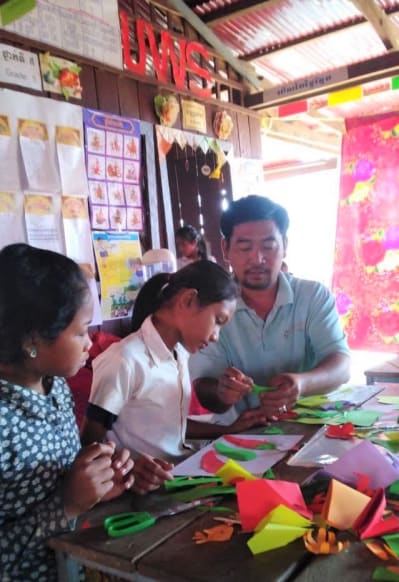
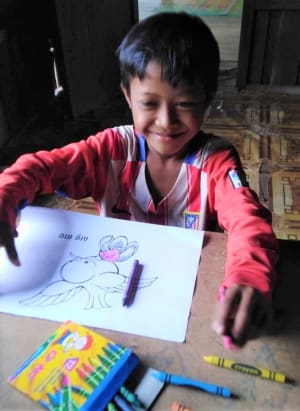
“My name is Surya Bahadur Thapa. I’m the Principal of UWS Helawubesi School and a class teacher - I’ve been here for two years and I take the responsibility of almost everything."
Surya Bahadur Thapa
This school has been working with United World Schools for the last 4 years – and since then a massive change can be seen. The first significant change was the improvement in the school’s infrastructure; the construction of buildings along with the improvement of toilets, drinking water and so on. All of this has attracted children to the school.
There have been teacher trainings, which give guidelines to teachers on how to teach, scientific teachings, punishment-free teaching, and training in how to motivate students to learn. This has created a fun and attractive environment for the students – they are free from the fear of punishments and have started perceiving the school environment as student-friendly where they are not intimidated by the teachers.
Before this school was here, children in this village had to walk for 2 hours to reach the nearest school. This meant that the younger children couldn’t walk there and so children only joined when they were 8-10 years old – they didn’t like to attend the lower classes at this higher age and there were many drop-outs. Now we are able to send our children to school from an early age.
Earlier, students used to go home in the lunch break and did not come back. The school environment wasn’t student-friendly, so they were reluctant to attend school. But now, after the training of UWS, and the presence of fellow teachers and mobilisers, a good environment has been created. The teachers are now motivated to be genuinely involved in improving the school environment. We have a periodic assessment system to evaluate students according to the predetermined objectives and this has really improved the level of teaching here.
In today’s world, education is the basis of development. If there is no development and change in the education sector, we cannot achieve any progress. First of all, we should make people aware, and make them responsible towards their community, home and country. That is the basic objective of education.
Without education, a person will struggle to find the right track and self-discipline. They won’t be able to separate what is right or wrong and what should be done. They won’t be able to get a perspective of the real world. So, education is very important.
There are currently 11 classes here at UWS Helawubesi School, with 159 students registered in total. This includes children from other districts, who walk here for up to two hours, because of our good teaching practices.
Thanks to United World Schools, we have been inspired to use English as the main medium from nursery level right up to class five onwards, and use government prescribed courses. So, the teaching has become much better.
More importantly, the community has been motivated to get more involved with the school - a great change in school management.”
At United World Schools, we work in partnership with local communities and governments, developing new schools over 5-7+ years and then gradually transitioning them to community and government ownership, so that they can become self-run Legacy Schools - part of our Theory of Change which is paving the way for a sustainable future for education. We've worked with the leading consultancy Education Partnerships Group to plan and deliver our schools' transition in a sustainable and effective way. This helps strengthen national education systems, avoids building a culture of dependency and empowers local people to be leaders... all whilst giving UWS the ability to open new schools in unreached communities across the globe.
Thanks to the hard work of the Roy community in Cambodia and the dedicated support of UWS staff and teachers, we've recently transitioned Roy School to become a Legacy School. This is their story.
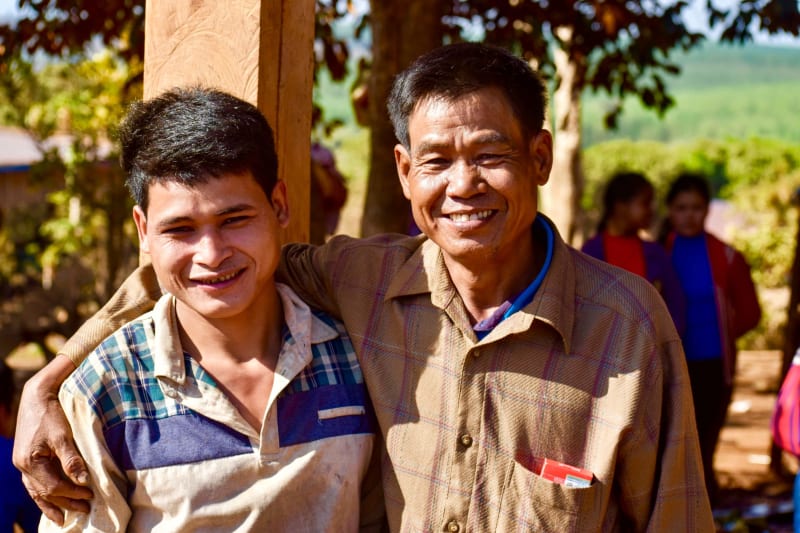
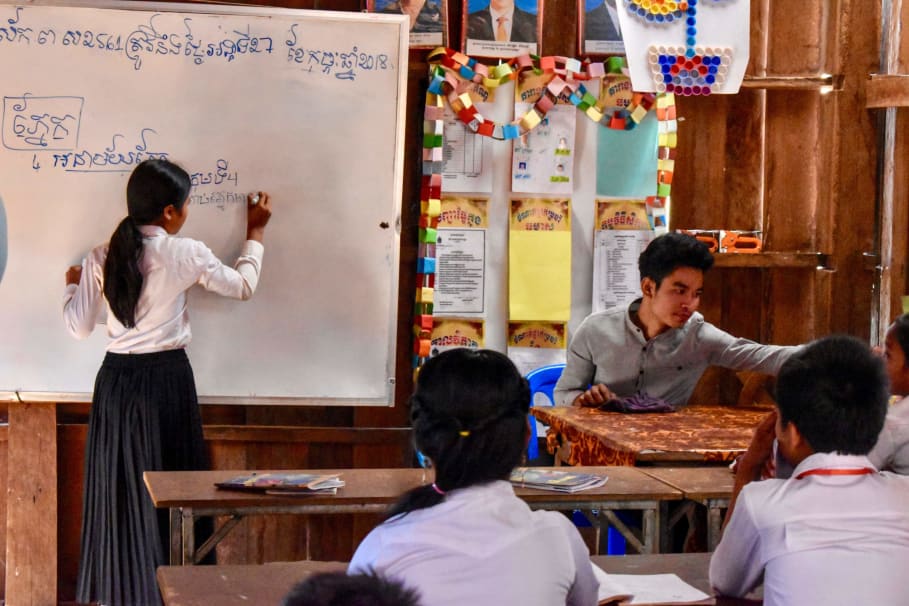
“There has been a huge transformation in the Roy village since this school was established. Now, the students are more thoughtful and they have their parents’ support to stay in school more than previous generations"
- Roy School’s Headteacher, Mr. Chom Nop
Roy School: A Legacy of Change
Recently, we transitioned our first 5 schools in Cambodia – including Roy School – from being run by United World Schools to becoming Legacy Schools run by local communities and governments, with on-going membership of the UWS Legacy School community. Roy School is located in a rural village in the Ratanakiri Province of Cambodia.
We built UWS Roy School back in 2012, with 197 children enrolling in our first year. Since then, Roy School has fast become one of the cornerstones of the local community. In the face of challenges inevitable with introducing a culture of education for the first time into a community, such as near-universal illiteracy and sporadic initial attendance, Roy School now has an academic pass rate of over 80% for their students. This is a huge achievement for a community which has never had access to education before. Not only do children get a great education, but they also play with their friends, learn to grow food in the school vegetable garden, borrow books from the school library and more.
“There has been a huge transformation in the Roy village since this school was established. Now, the students are more thoughtful and they have their parents’ support to stay in school more than previous generations,” says Roy School’s Headteacher, Mr. Chom Nop. “I’ve noticed that my Grade 6 children (11-12 year olds) are less likely to drop out of school to get married than they were before.”
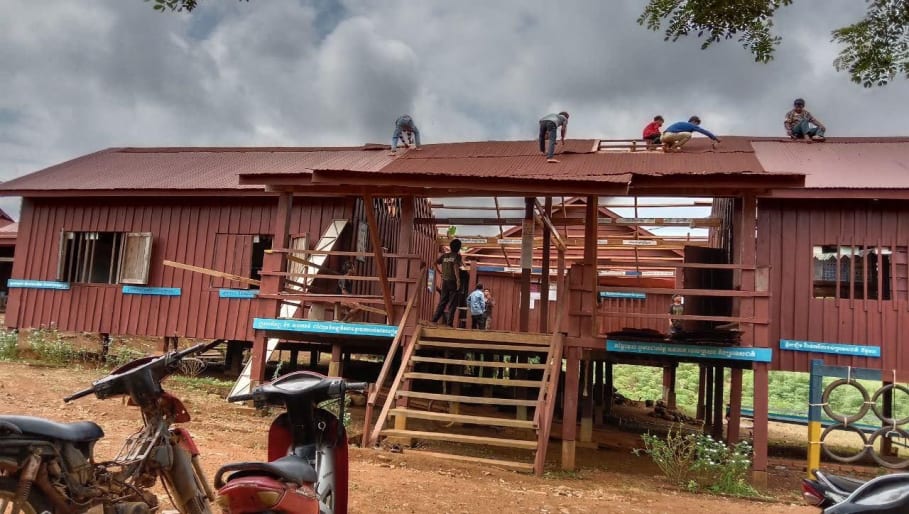
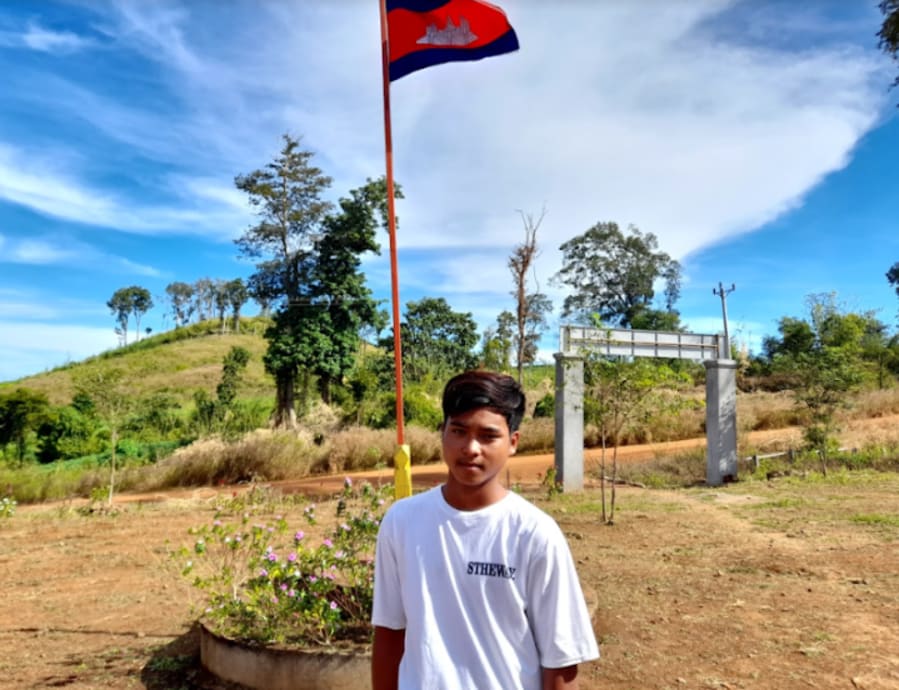
Most of the children in Roy Primary School are now going on to secondary school, to get a higher education and work to achieve their aspirations. 12-year-old Vithu has attended UWS Roy School from Grade 1 all the way to Grade 6, and he’s now going to continue his studies at Kes Chong high school.
Vithu has fond memories of Roy School; from reading the new storybooks that UWS stocked the library with each year, to learning to play new sports with his friends, to coming first in his class in Grade 4 and 5.
“My teachers, Mr. Sok and Mr. Nop, are my role models,” says Vithu. “Whenever I needed help, I could ask my teachers. They always helped me and gave me extra lessons. I want to become a great teacher just like them one day.”
With its strong team of teachers, an excellent School Support Committee and great school management team, Roy School was well positioned to transition being self-governed, becoming a Legacy School. The UWS team worked alongside the school, the Cambodian government and most importantly, the local community, to facilitate the transition process.
Our team worked to connect the school management team to the local authorities so that the school can receive annual funding from the Cambodian education sector, as well as support in all other areas. We facilitated introduction meetings with the relevant authorities, supporting and guiding the school throughout. We also made all necessary repairs to the school in advance, so that there would be less complications for the school management. For the first year after the transition, UWS' Education Officers will visit Roy School every quarter to support the team. Roy School has also become a member of the growing UWS Legacy School community.
The transition from a UWS School to a Legacy School can be challenging, but the Roy community came together for the students. Team UWS will continue to support the community staff and teachers as they take the full running of the school into their capable hands. We have no doubt that they will continue to inspire students and transform their own community for years to come.
True change takes time, dedication and the hard work of entire communities. The Roy village have taken the support of UWS and run with it, with children like Vithu right at the forefront of a transformation which will be felt for generations.

